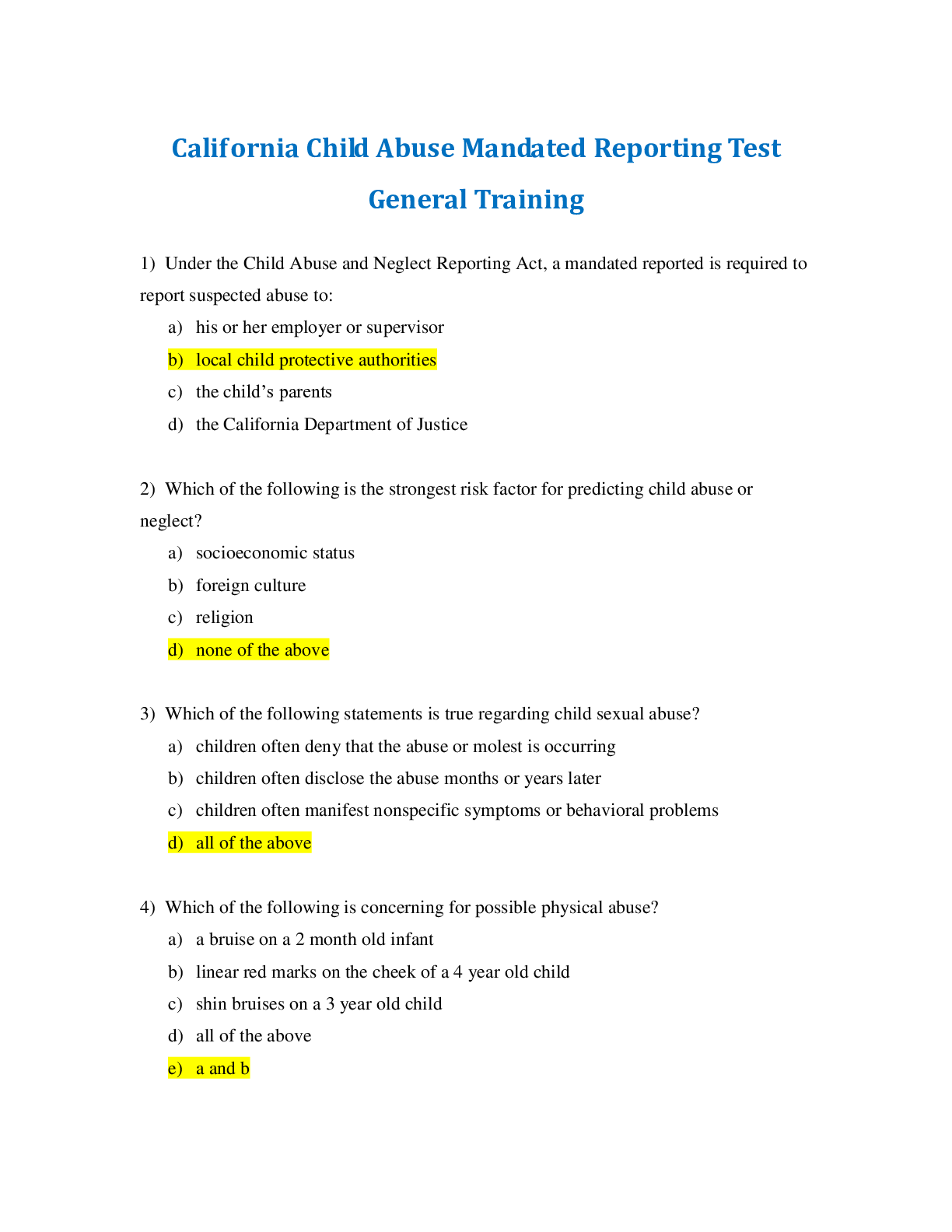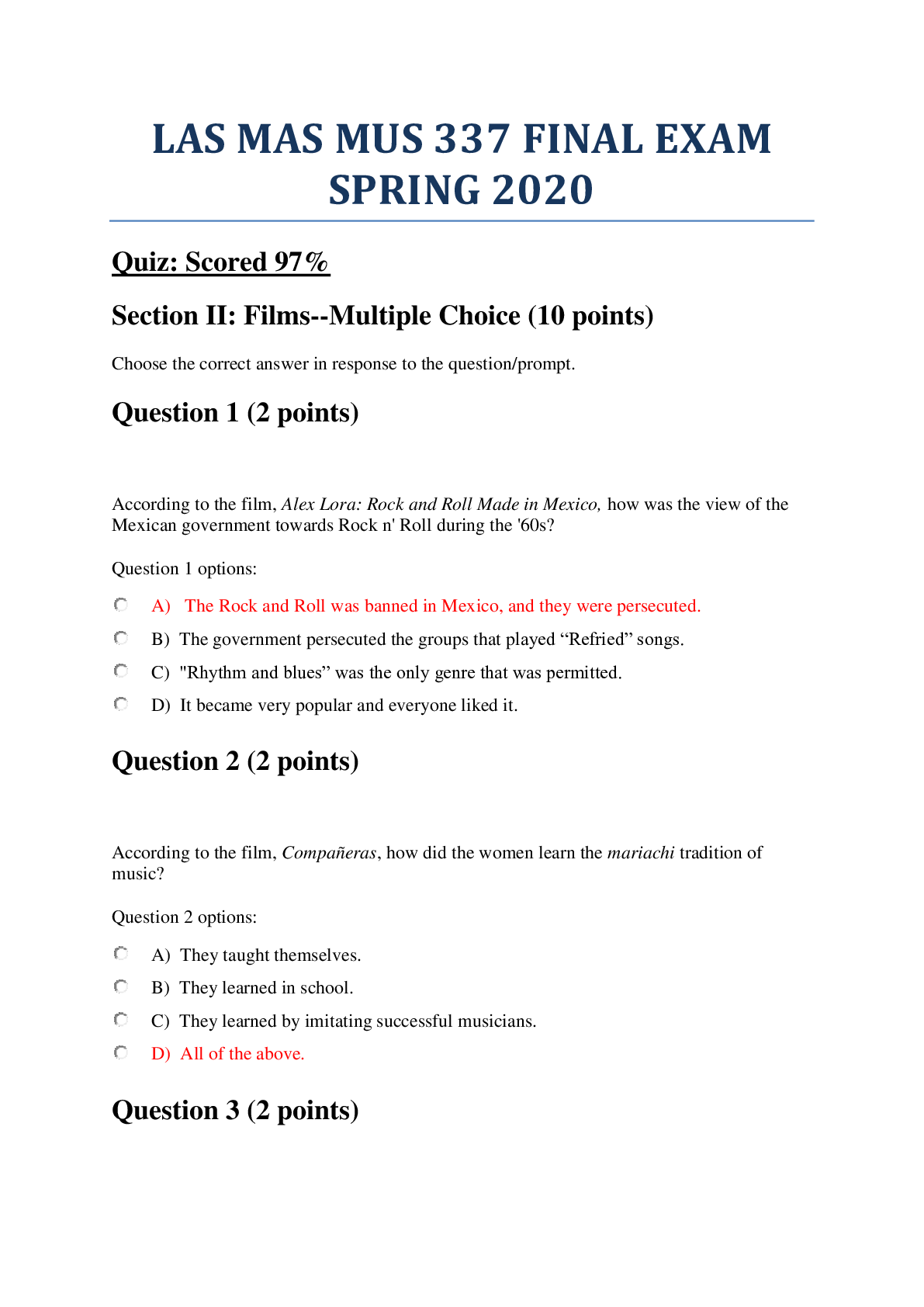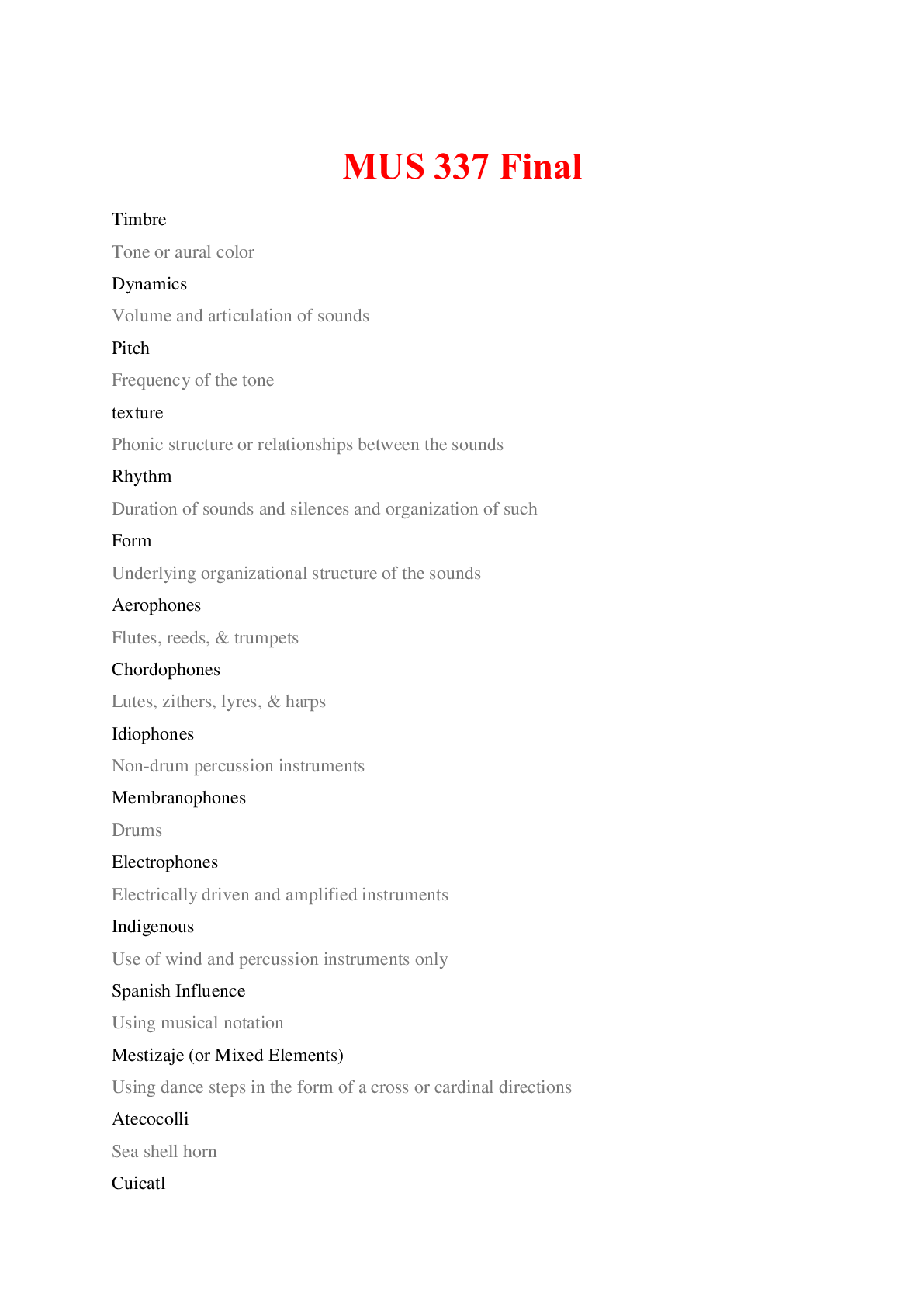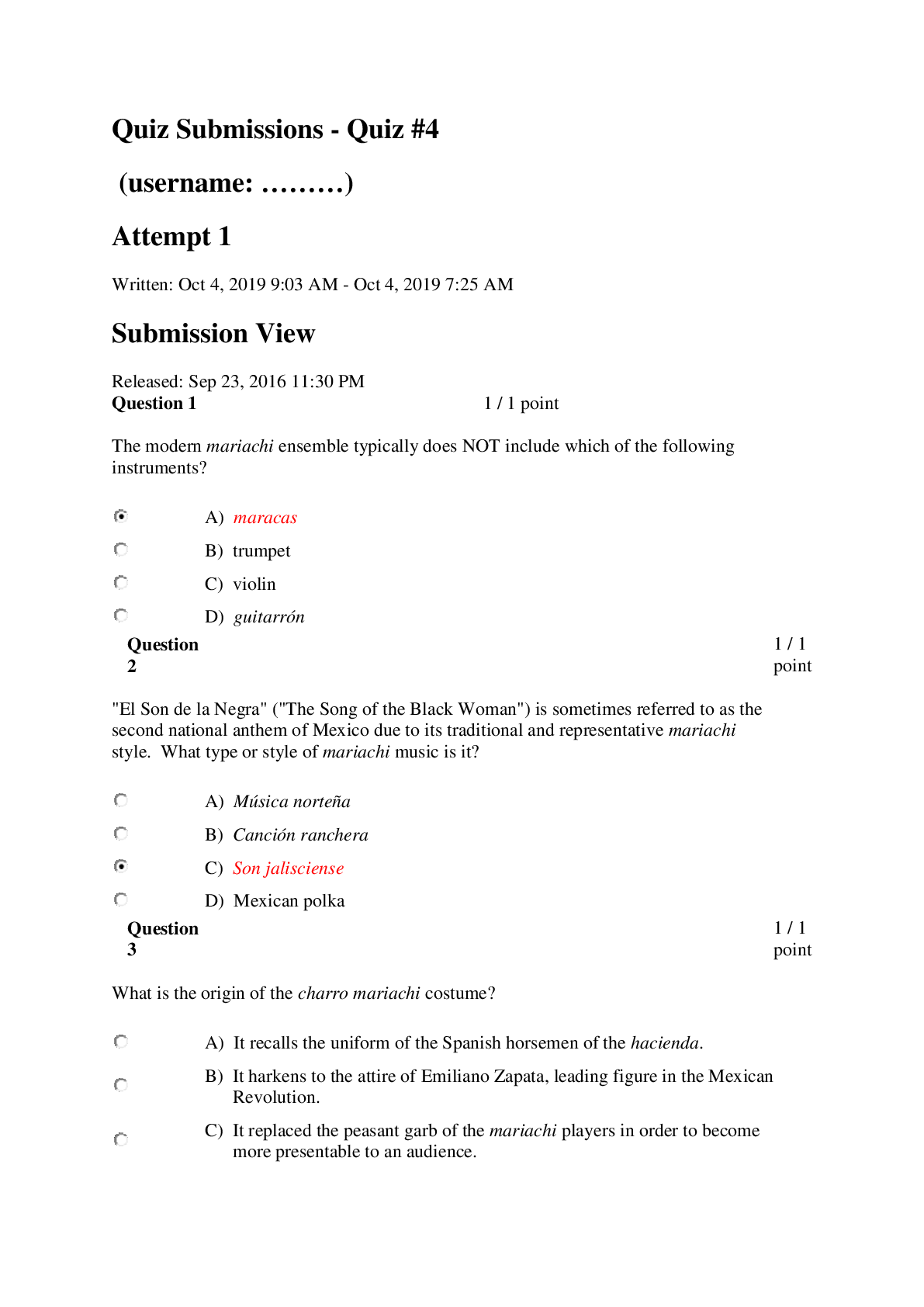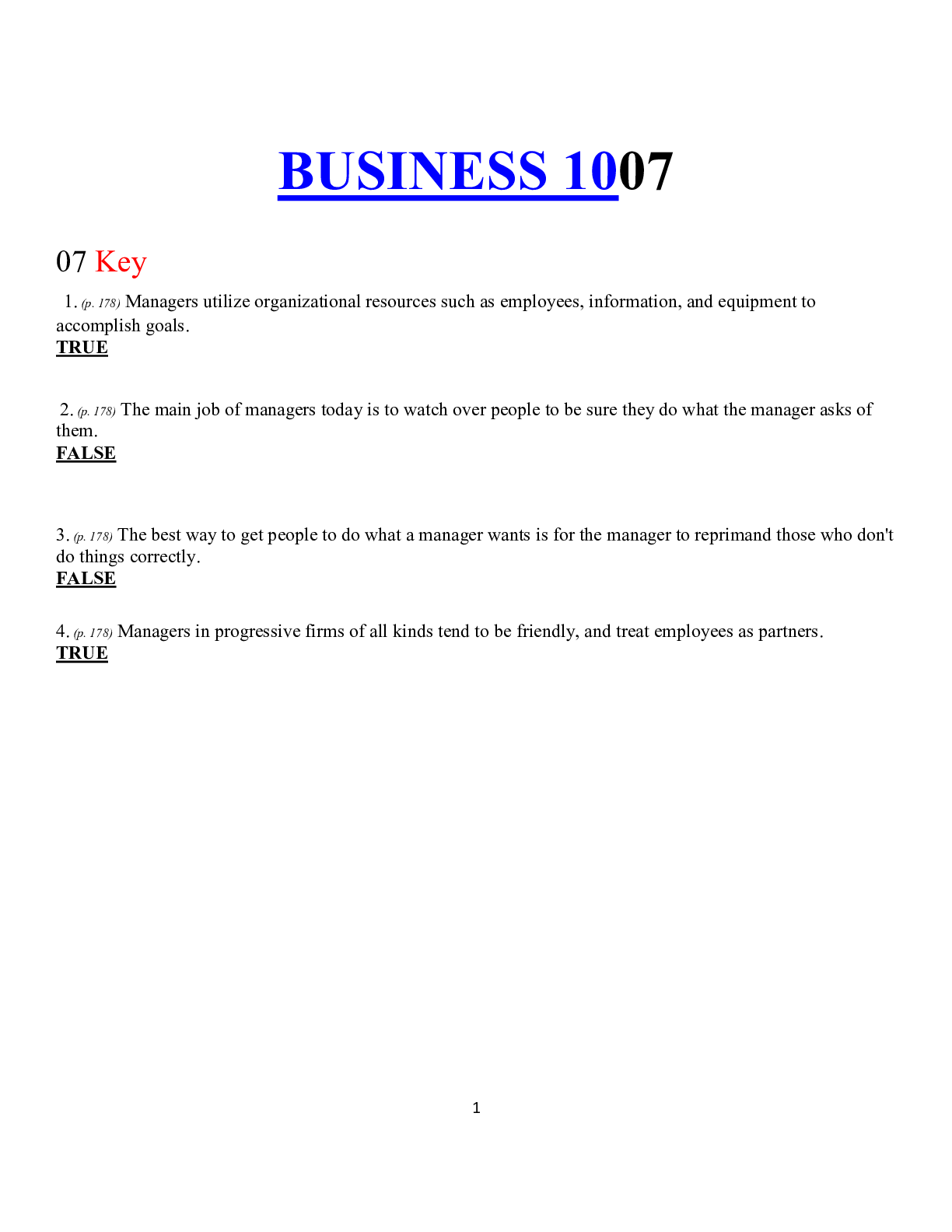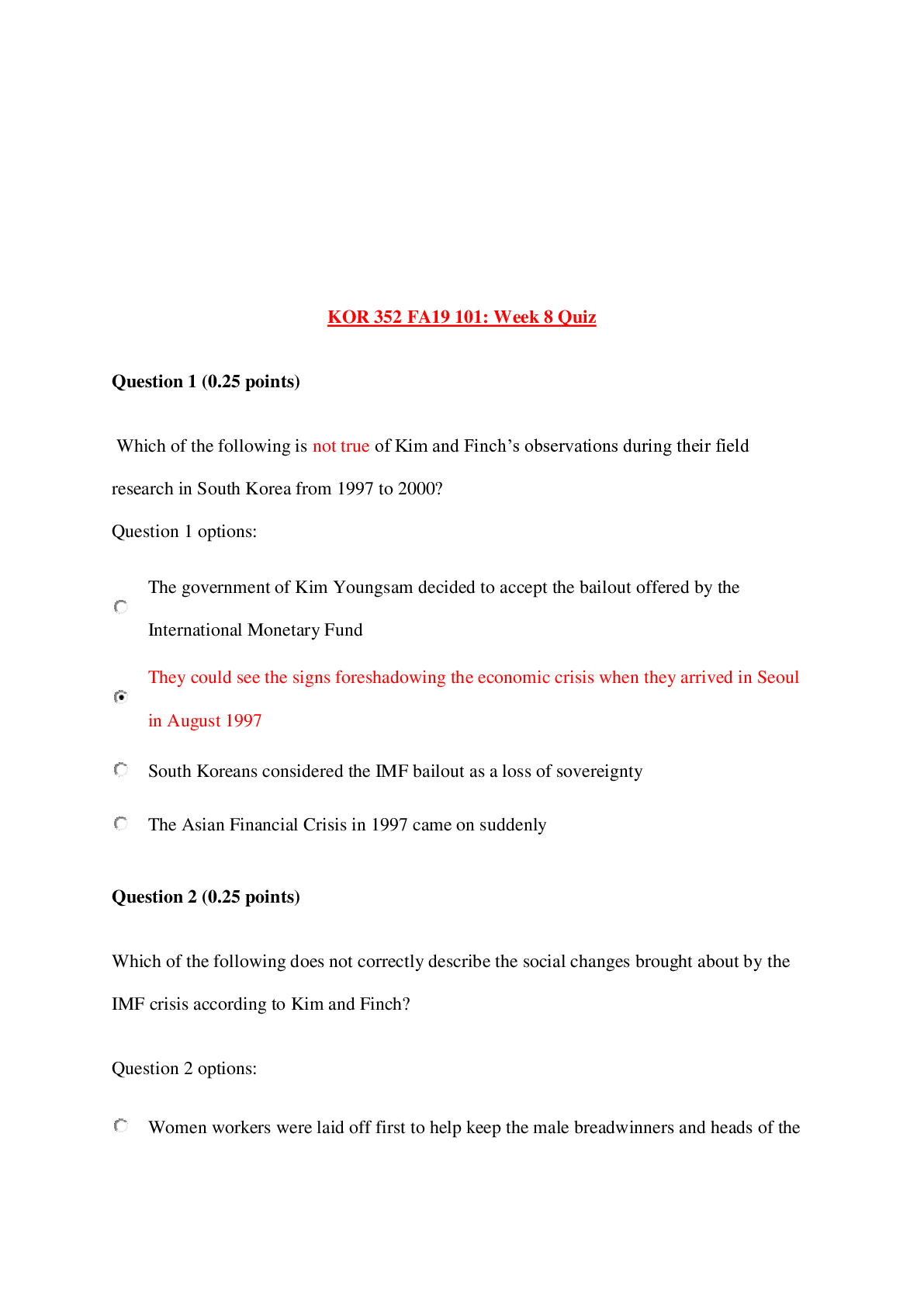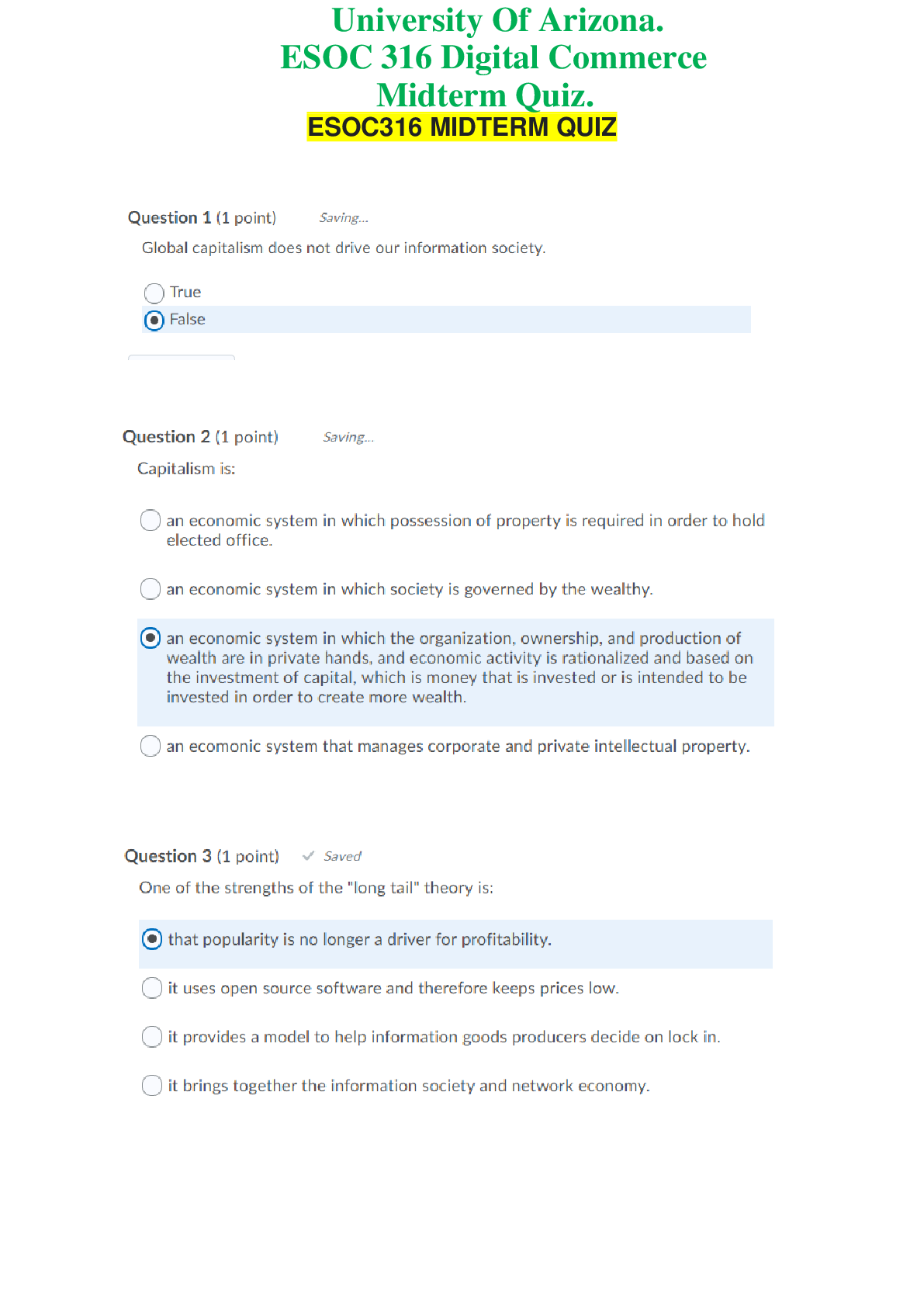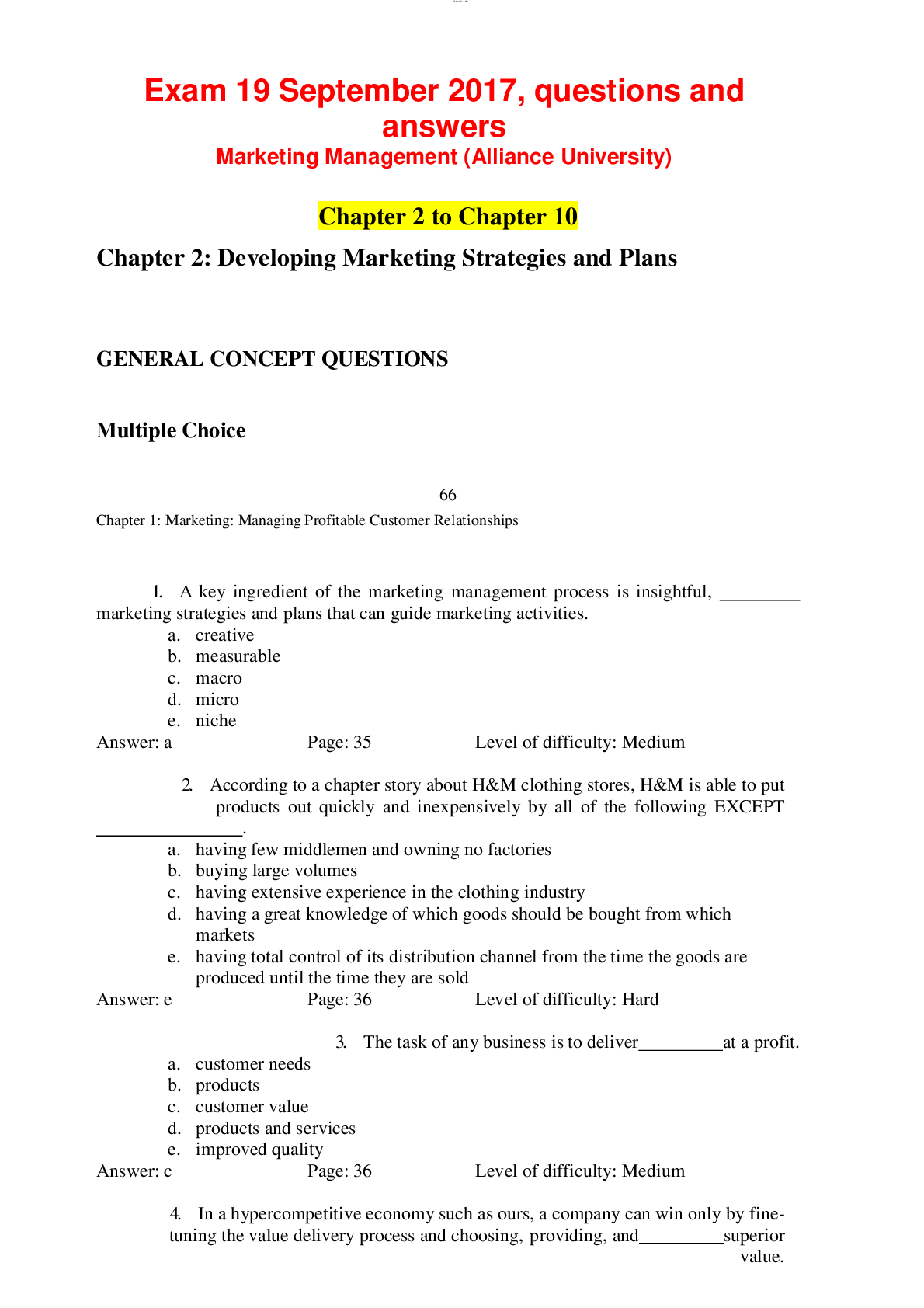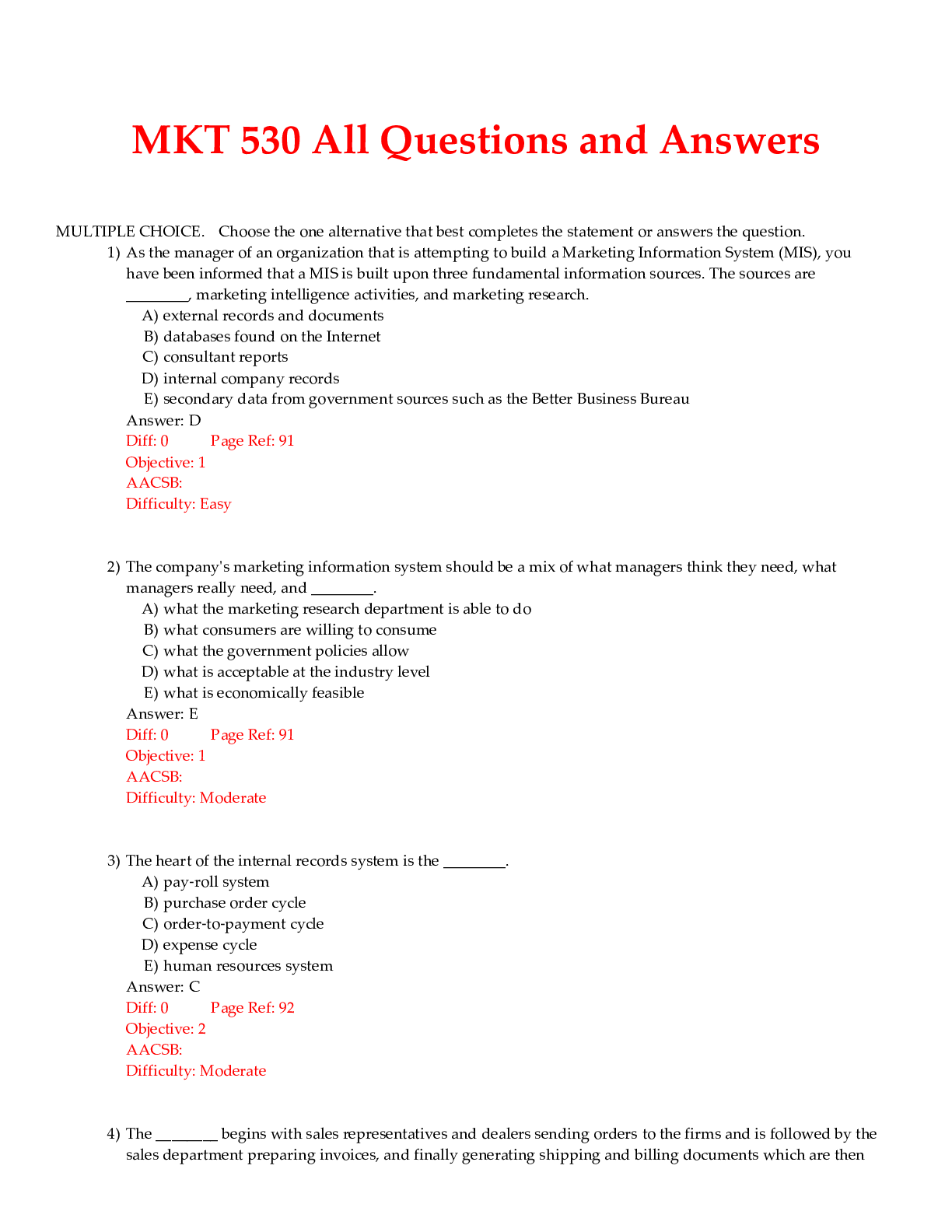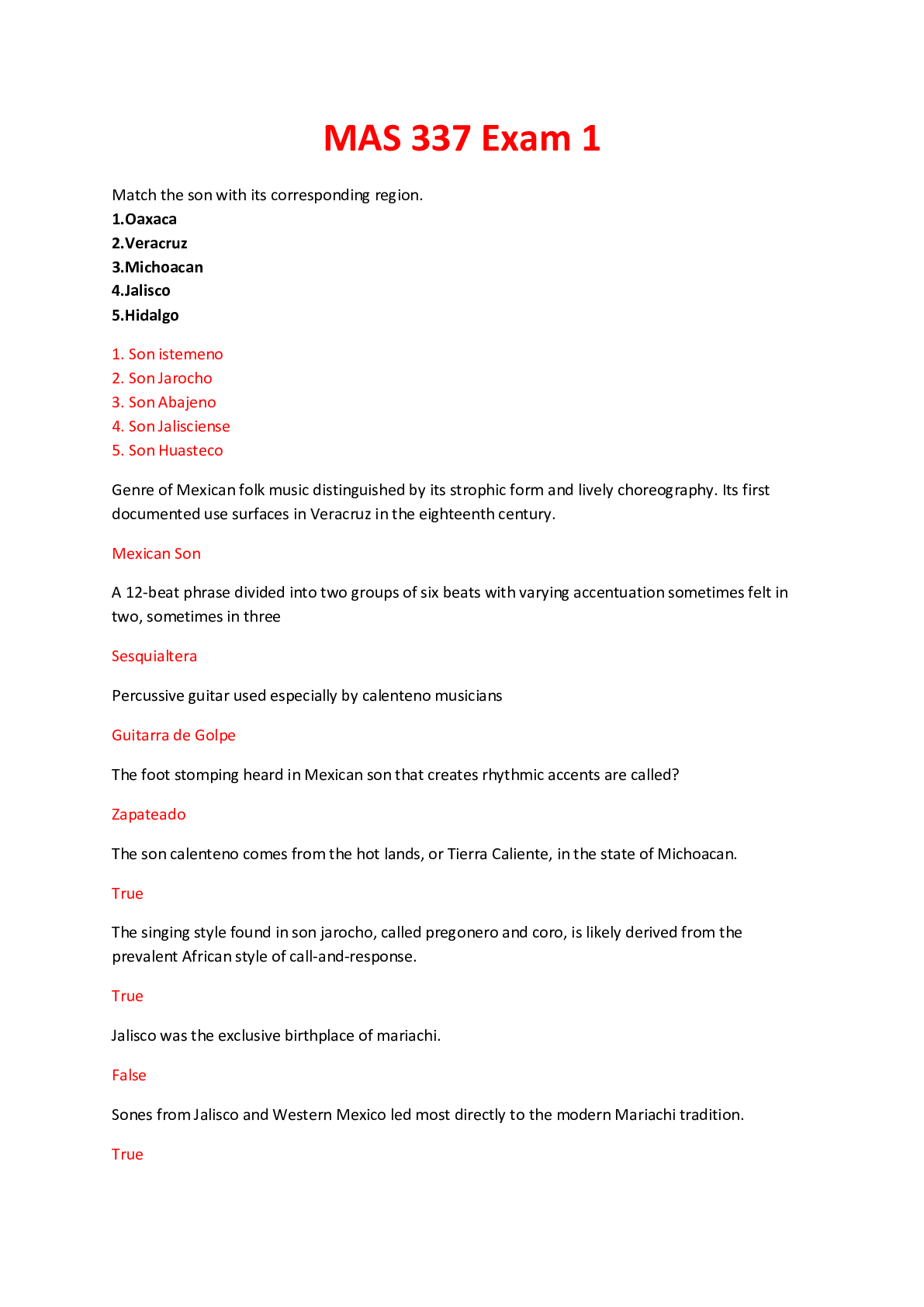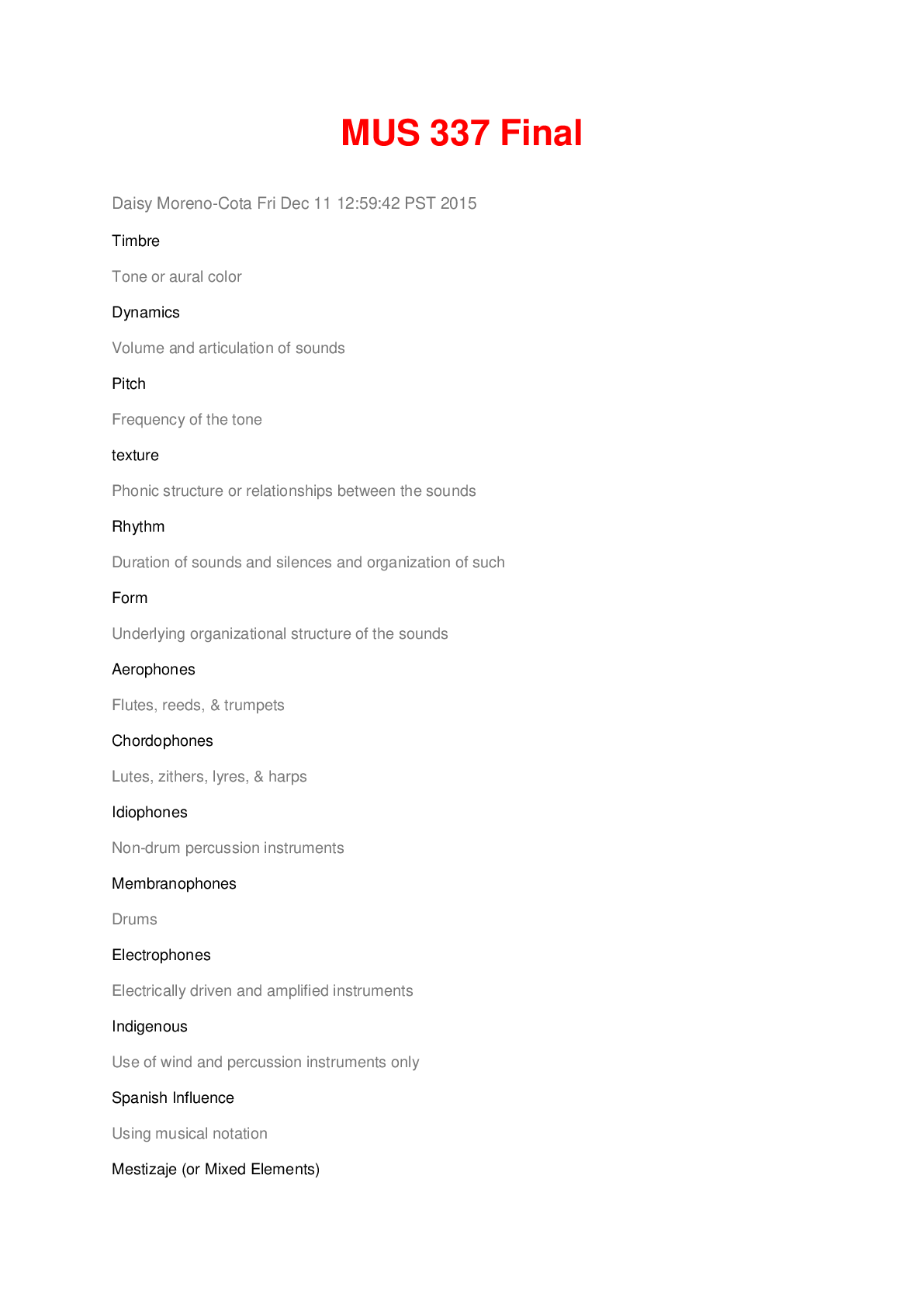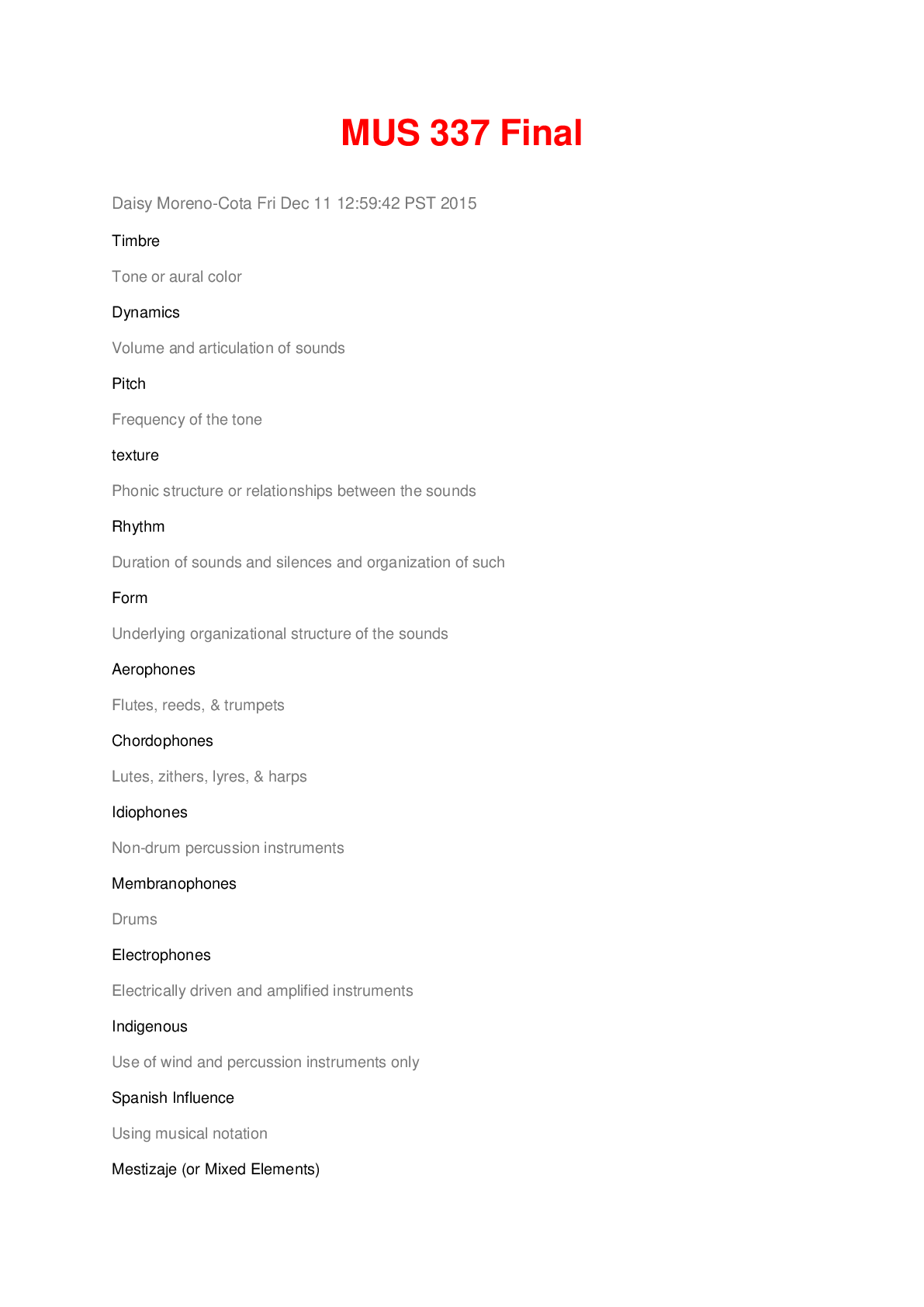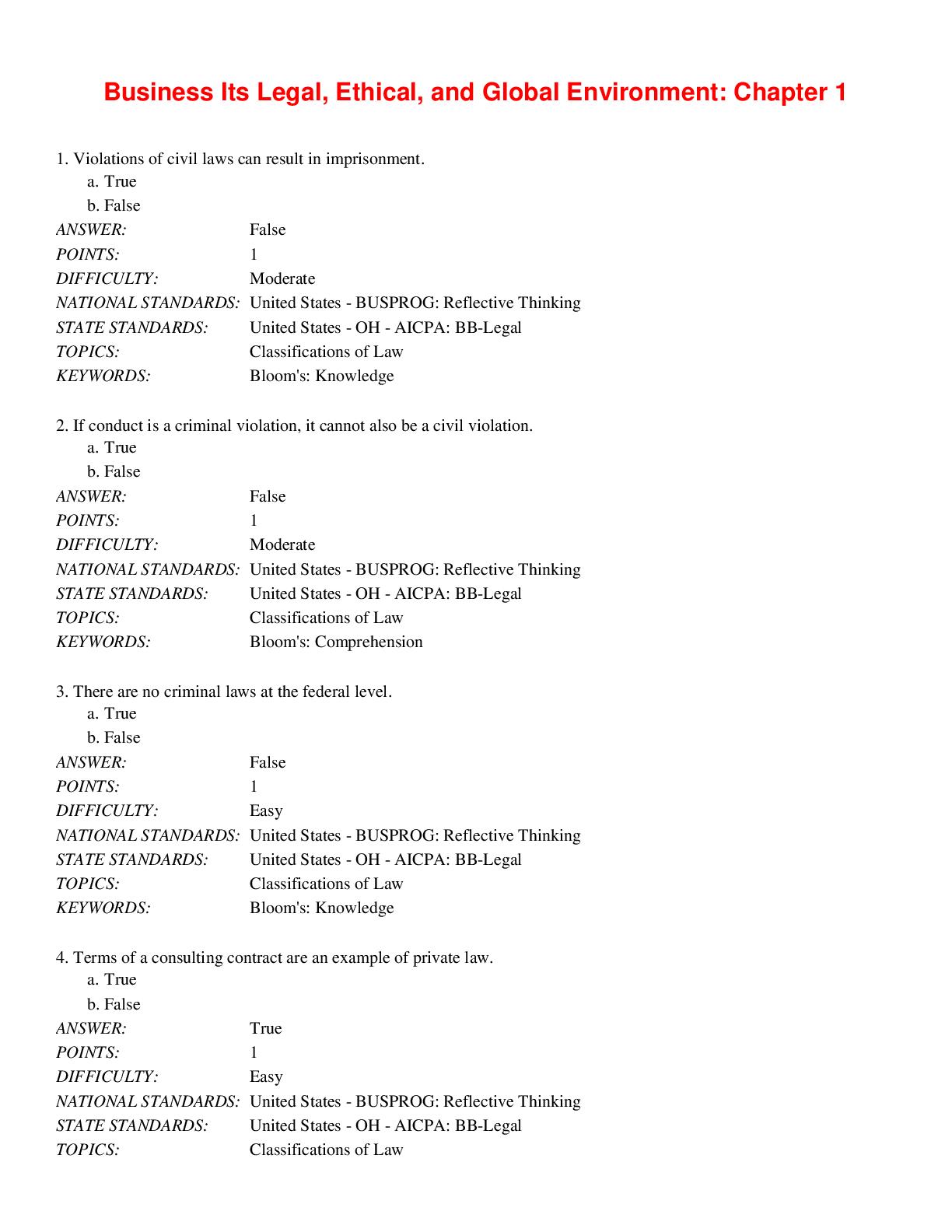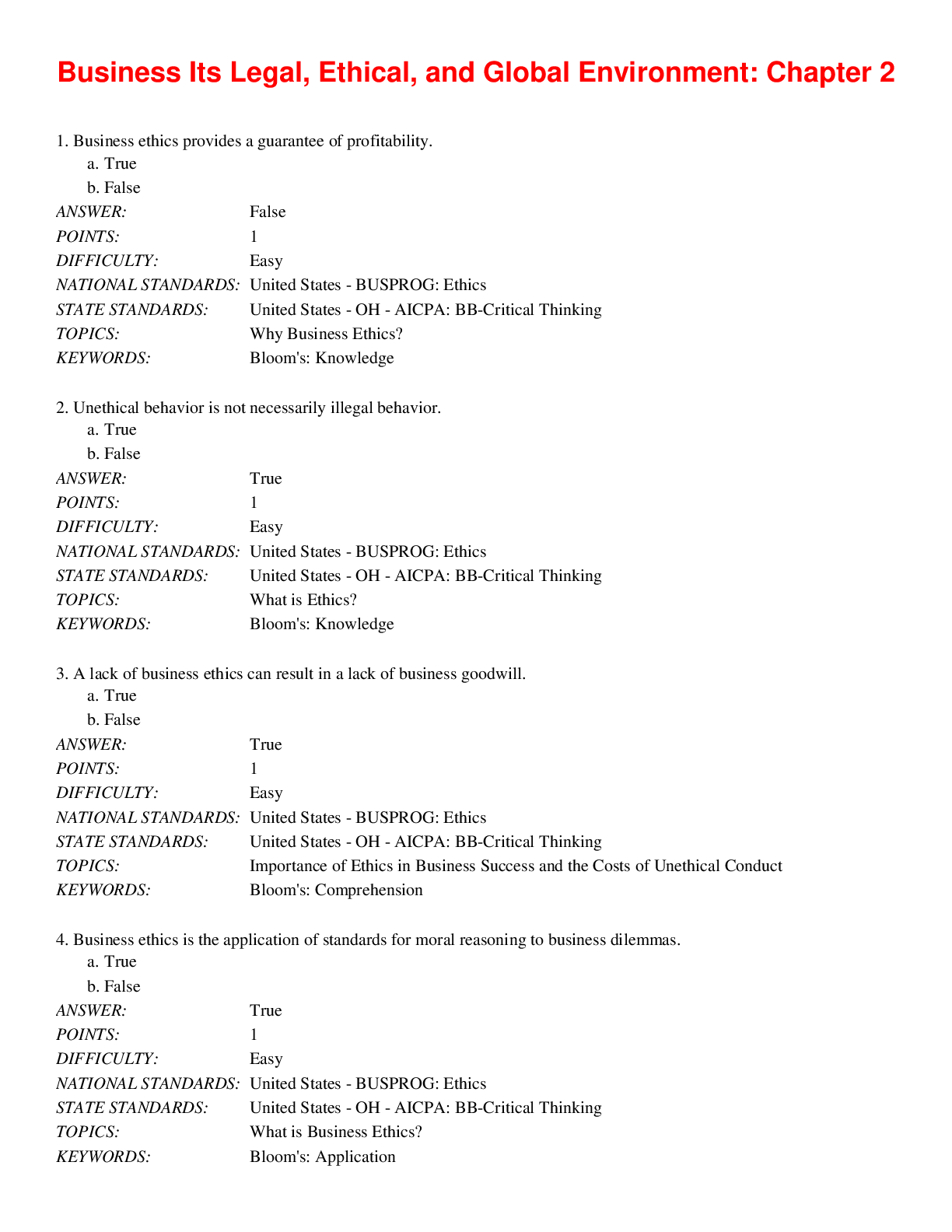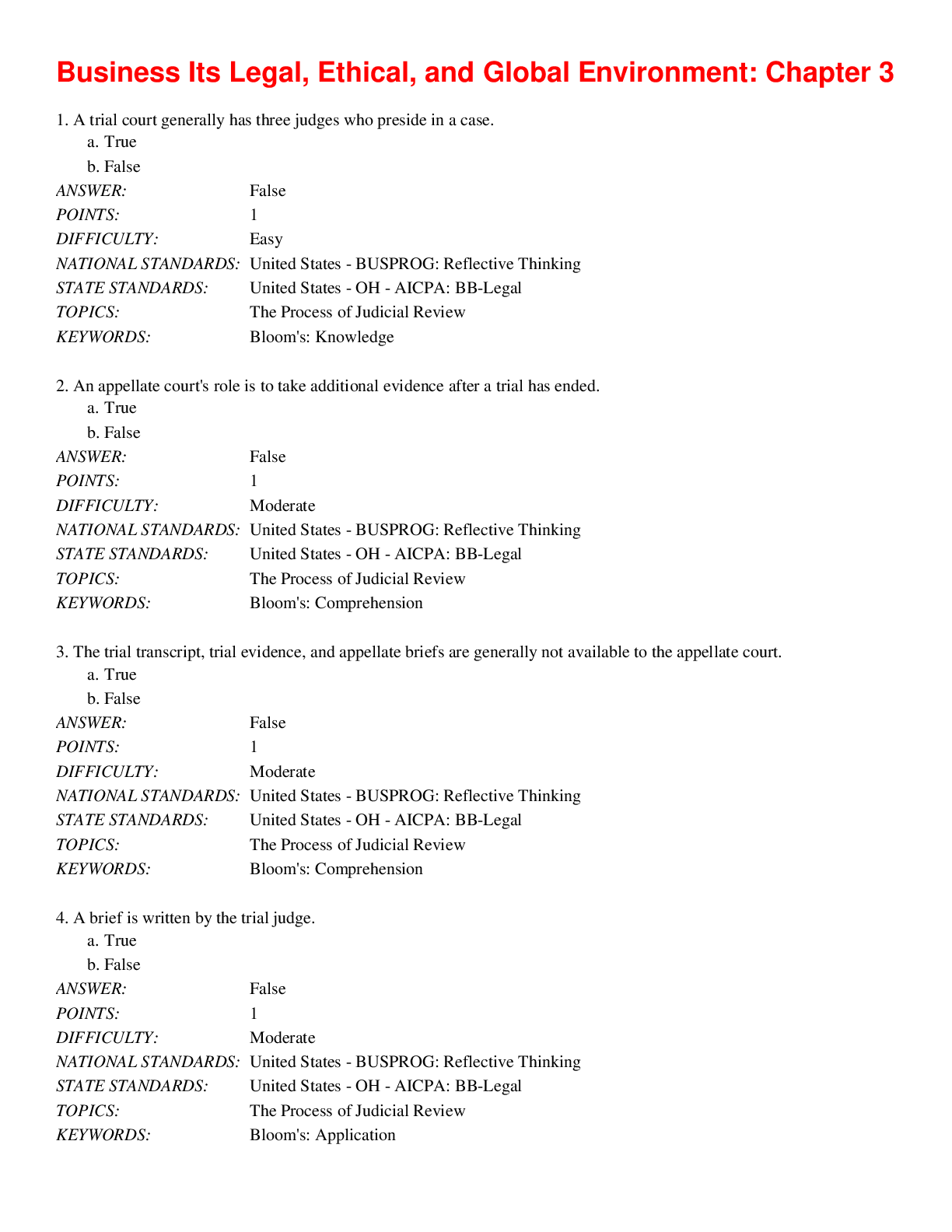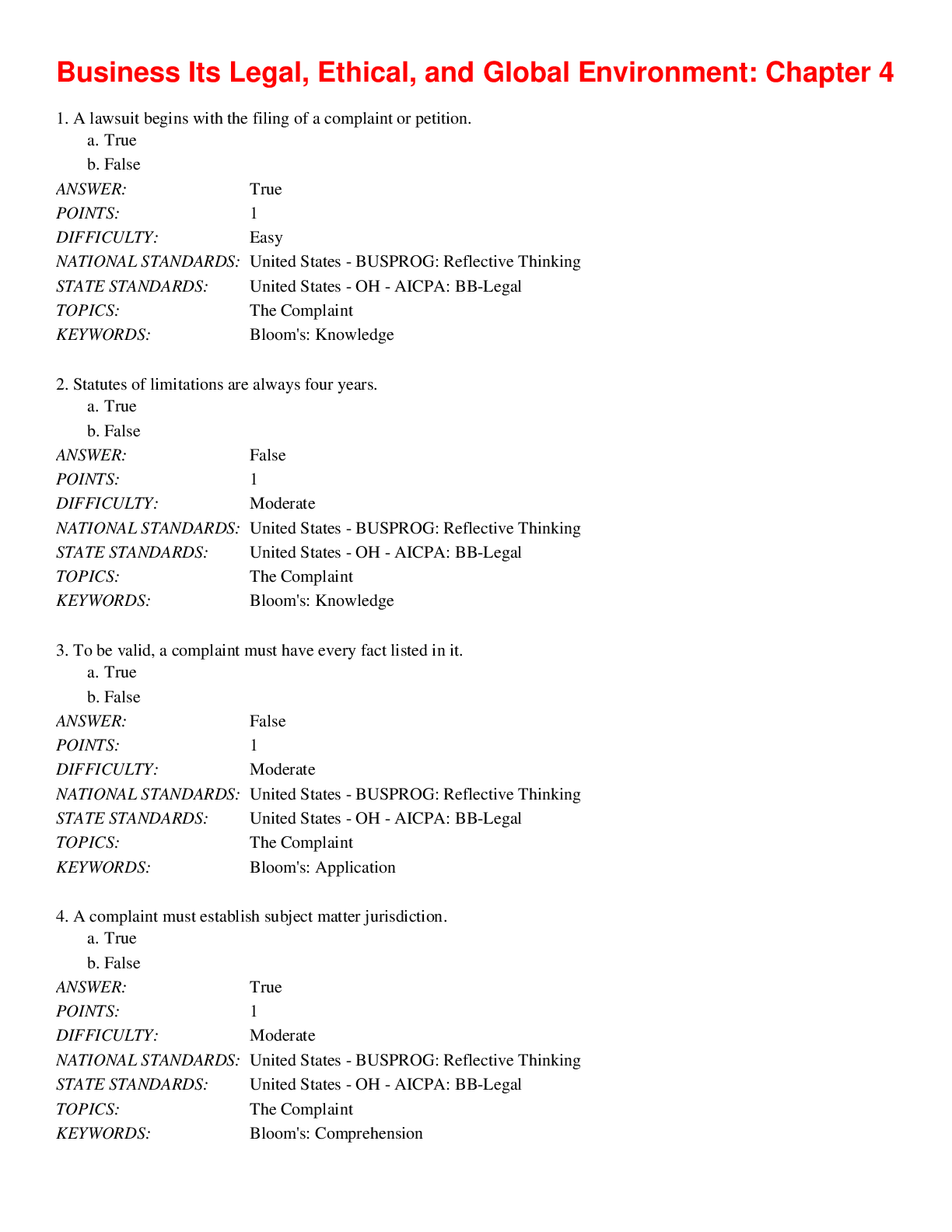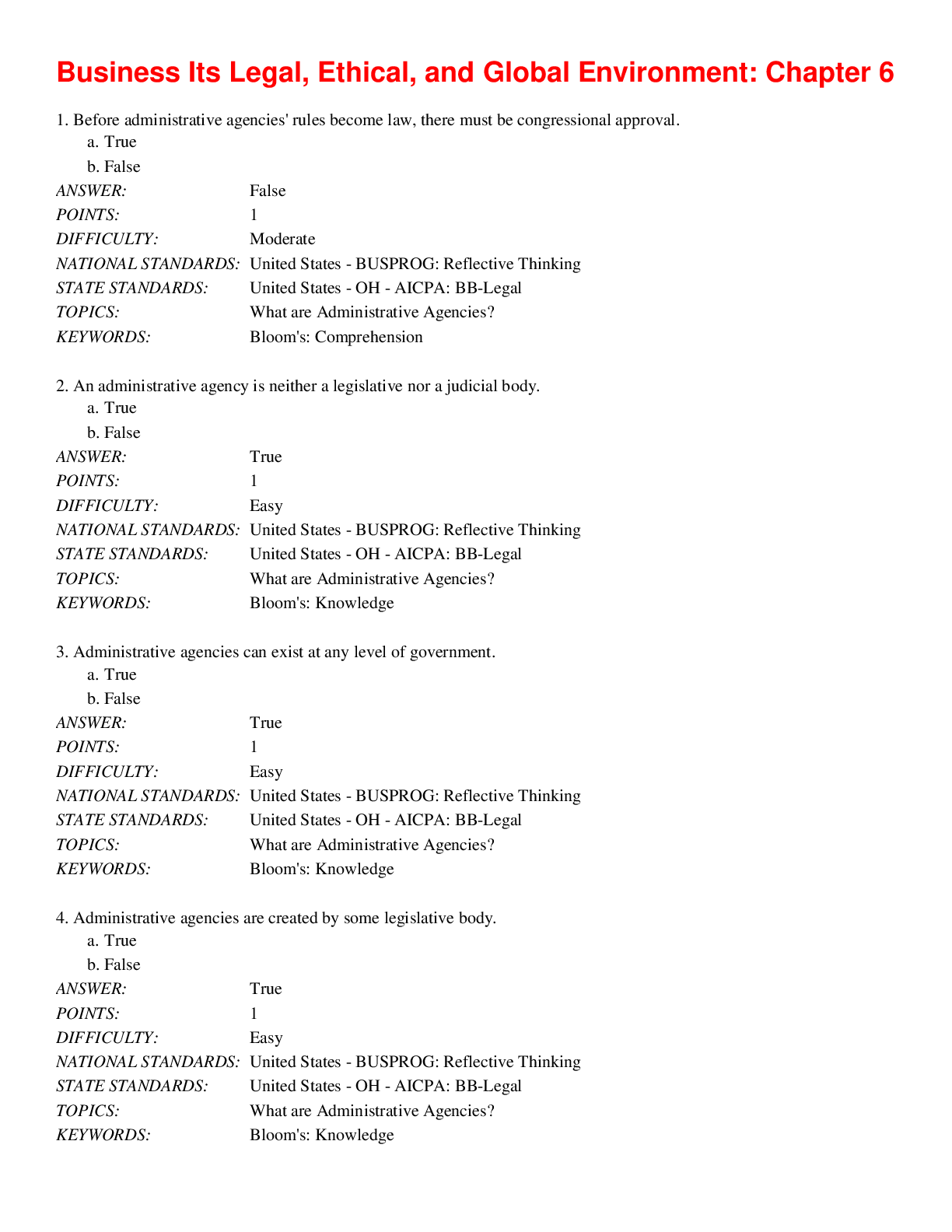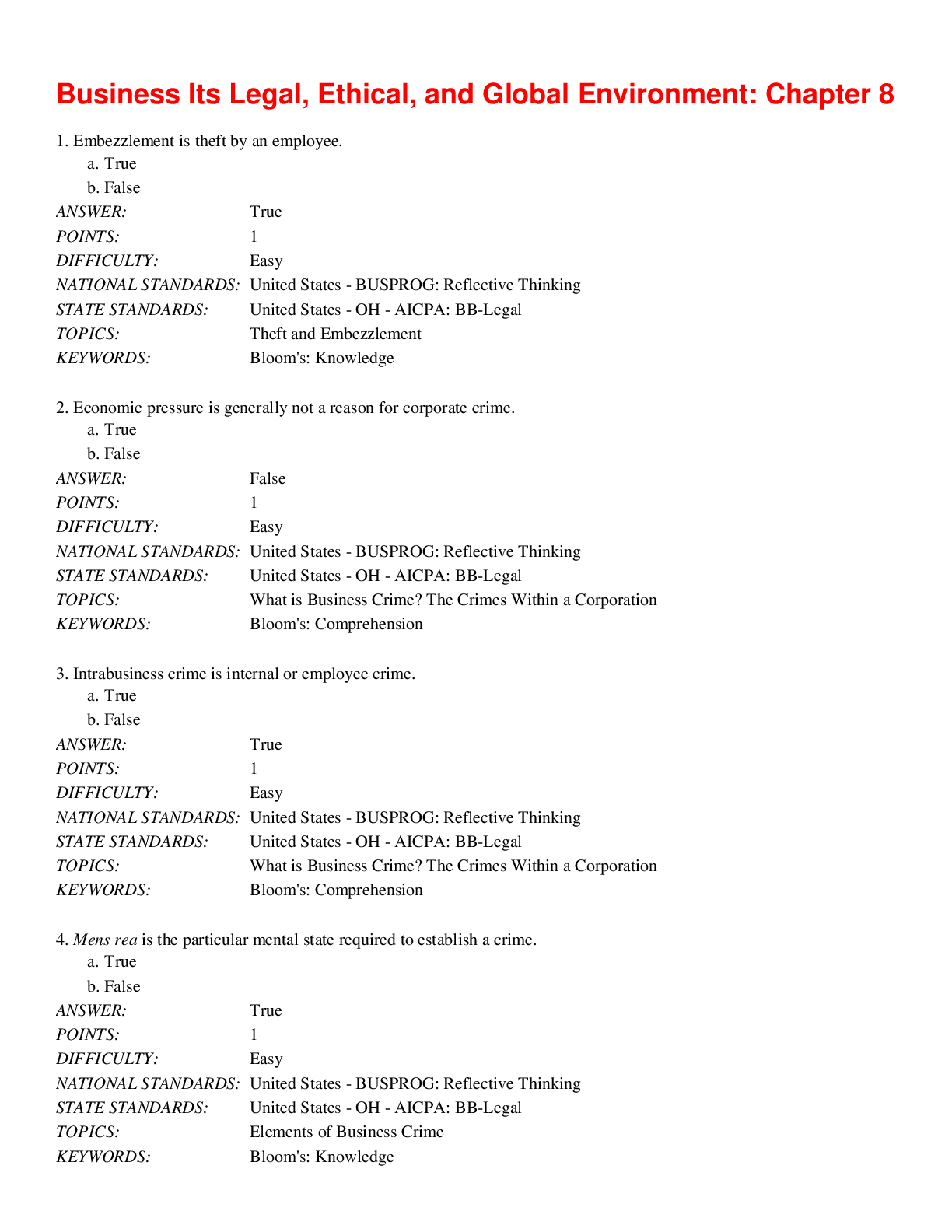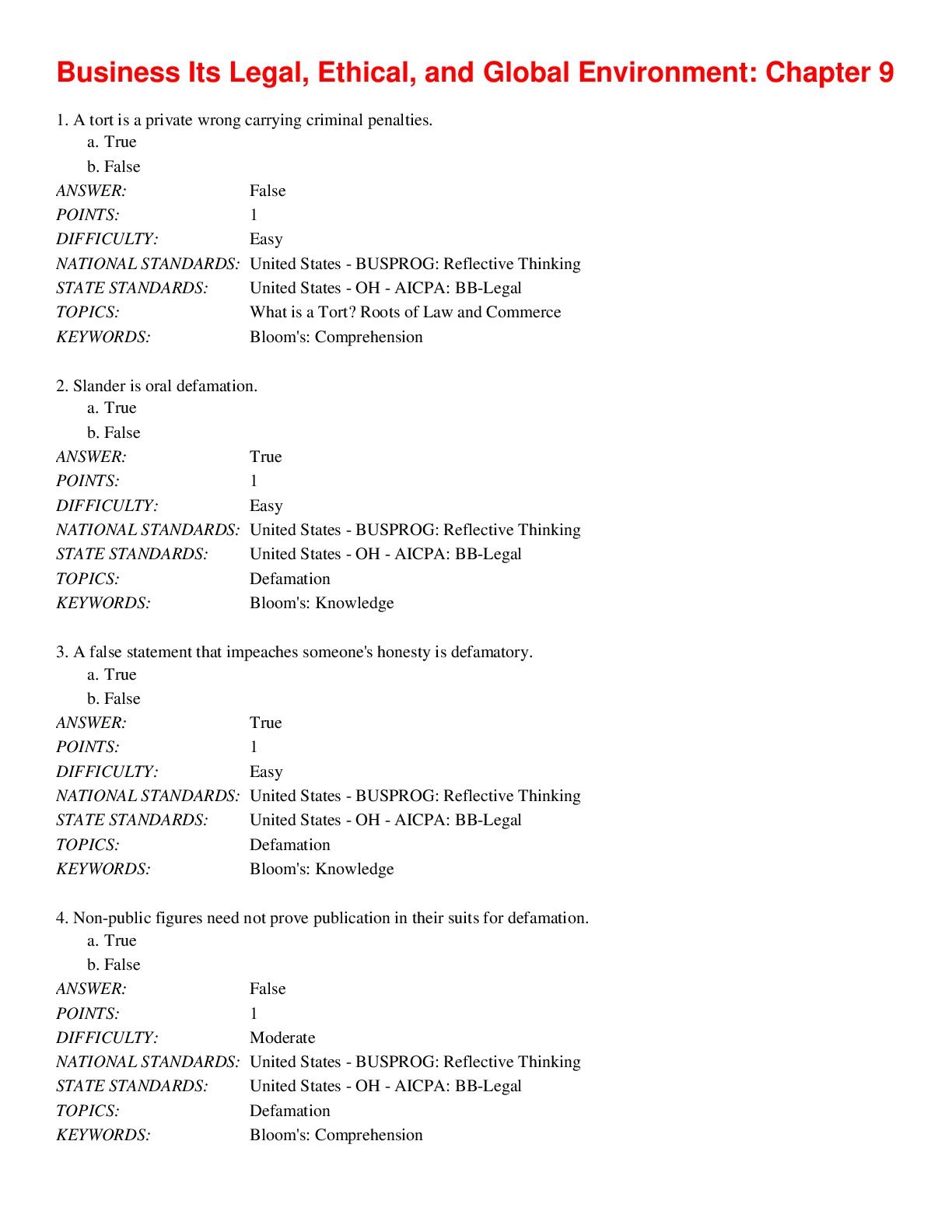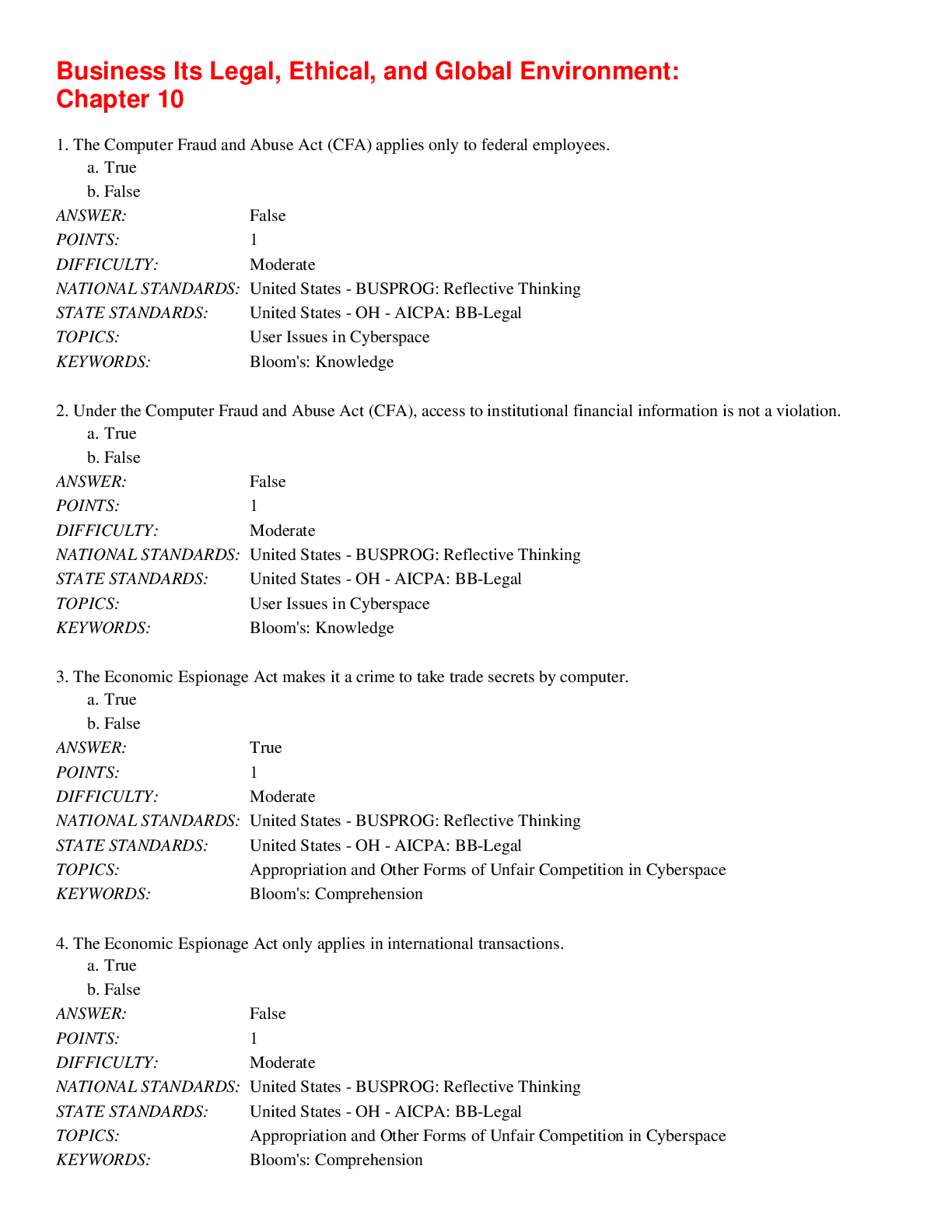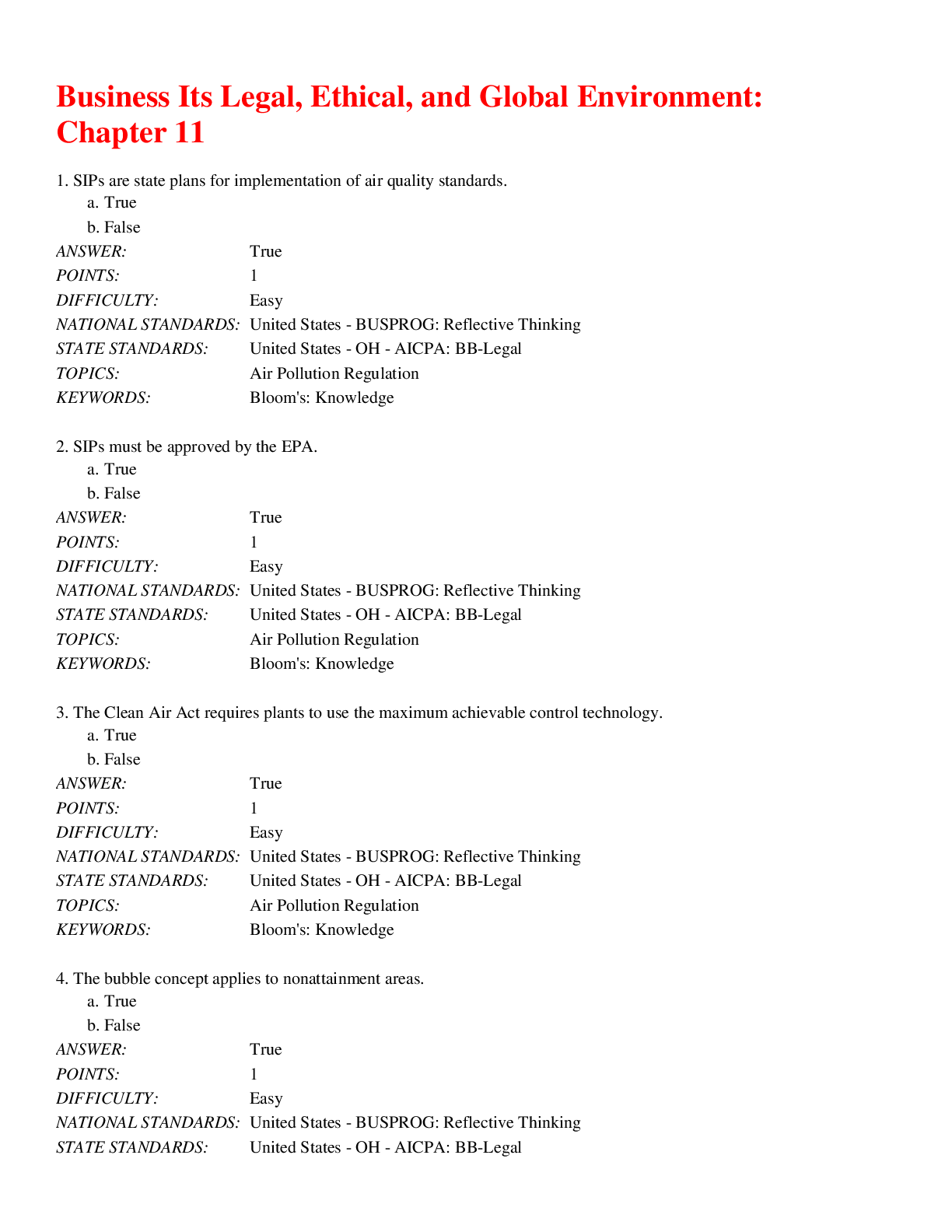Business Administration > QUESTIONS & ANSWERS > Business Its Legal, Ethical, and Global Environment: Chapter 7. All Answers (All)
Business Its Legal, Ethical, and Global Environment: Chapter 7. All Answers
Document Content and Description Below
1. The U.S. system of law is based primarily on code law. a. b. : : 1 : Easy : United States - BUSPROG: Reflective Thinking : United States - OH - AICPA: BB-Legal Sources... of International Law Bloom's: Knowledge 2. GATT is the result of a multilateral treaty. a. b. : : 1 : Easy : United States - BUSPROG: Reflective Thinking : United States - OH - AICPA: BB-Legal Sources of International Law Bloom's: Knowledge 3. Sovereign immunity protects individual nation's operations from outside interference. a. b. : : 1 : Easy : United States - BUSPROG: Reflective Thinking : United States - OH - AICPA: BB-Legal Principles of International Law Bloom's: Knowledge 4. Under the doctrine of sovereign immunity, commercial transactions cannot be regulated. a. b. : : 1 : Easy : United States - BUSPROG: Reflective Thinking : United States - OH - AICPA: BB-Legal Principles of International Law Bloom's: Knowledge 5. Expropriation is prohibited in countries that are members of the United Nations. a. b. : : 1 : Easy : United States - BUSPROG: Reflective Thinking : United States - OH - AICPA: BB-Legal Principles of International Law Bloom's: Knowledge 6. Nationalization is a process of eminent domain. a. b. : : 1 : Easy : United States - BUSPROG: Reflective Thinking : United States - OH - AICPA: BB-Legal Principles of International Law Bloom's: Knowledge 7. U.S. courts have no jurisdiction over foreign businesses with operations in the United States. a. b. : : 1 : Easy : United States - BUSPROG: Reflective Thinking : United States - OH - AICPA: BB-Legal Principles of International Law Bloom's: Knowledge 8. U.S. securities laws would not apply to countries selling securities in the United States under the doctrine of sovereign immunity. a. b. : : 1 : Moderate : United States - BUSPROG: Reflective Thinking : United States - OH - AICPA: BB-Legal Principles of International Law Bloom's: Application 9. The act of state doctrine precludes outside interference in expropriation. a. b. : : 1 : Moderate : United States - BUSPROG: Reflective Thinking : United States - OH - AICPA: BB-Legal Principles of International Law Bloom's: Application 10. The Overseas Private Investment Corporation is an insurer against expropriation. a. b. : : 1 : Moderate : United States - BUSPROG: Reflective Thinking : United States - OH - AICPA: BB-Legal Principles of International Law Bloom's: Knowledge 11. Repatriation is the limitation on removal of profits earned in a country from that country. a. b. : : 1 : Moderate : United States - BUSPROG: Reflective Thinking : United States - OH - AICPA: BB-Legal Principles of International Law Bloom's: Knowledge 12. The doctrine of forum non conveniens is used to dismiss cases brought in courts in the wrong nation. a. b. : : 1 : Moderate : United States - BUSPROG: Reflective Thinking : United States - OH - AICPA: BB-Legal Principles of International Law Bloom's: Application 13. The U.S. antitrust laws apply only to U.S. firms. a. b. : : 1 : Easy : United States - BUSPROG: Reflective Thinking : United States - OH - AICPA: BB-Legal Protections in International Competition Bloom's: Knowledge 14. The Export Trading Company Act allows for international joint ventures that would otherwise be anticompetitive. a. b. : : 1 : Easy : United States - BUSPROG: Reflective Thinking : United States - OH - AICPA: BB-Legal Protections in International Competition Bloom's: Knowledge 15. Some of the most active pirates are from Cuba. a. b. : : 1 : Easy : United States - BUSPROG: Reflective Thinking : United States - OH - AICPA: BB-Legal Sources of International Law Bloom's: Knowledge 16. Under the doctrine of sovereign immunity, a country cannot be forced to civil or criminal charges in a U.S. court. a. b. : : 1 : Easy : United States - BUSPROG: Reflective Thinking : United States - OH - AICPA: BB-Legal Principles of International Law Bloom's: Knowledge 17. A foreign country engaging in commercial transactions in the United States is not protected by the doctrine of sovereign immunity for those transactions. a. b. : : 1 : Easy : United States - BUSPROG: Reflective Thinking : United States - OH - AICPA: BB-Legal Principles of International Law Bloom's: Knowledge 18. Foreign businesses engaging in commercial activity in the United States are not subject to U.S. antitrust laws. a. b. : : 1 : Easy : United States - BUSPROG: Reflective Thinking : United States - OH - AICPA: BB-Legal Principles of International Law Bloom's: Knowledge 19. Tariffs can be revenue-raising and protectionist for domestic goods. a. b. : : 1 : Easy : United States - BUSPROG: Reflective Thinking : United States - OH - AICPA: BB-Legal Protections in International Competition Bloom's: Knowledge 20. GATT is a 150-member free trade agreement. a. b. : : 1 : Easy : United States - BUSPROG: Reflective Thinking : United States - OH - AICPA: BB-Legal Sources of International Law Bloom's: Knowledge 21. The Kyoto Treaty has now been ratified by all signatory countries. a. b. : : 1 : Easy : United States - BUSPROG: Reflective Thinking : United States - OH - AICPA: BB-Legal Sources of International Law Bloom's: Knowledge 22. The Justice Department does not offer any assistance to companies with questions about Foreign Corrupt Practices Act requirements. a. b. : : 1 : Easy : United States - BUSPROG: Reflective Thinking : United States - OH - AICPA: BB-Legal Trust, Corruption, Trade, and Economics Bloom's: Knowledge 23. The Act of State Doctrine applies to antitrust issues for member countries of the United Nations. a. b. : : 1 : Easy : United States - BUSPROG: Reflective Thinking : United States - OH - AICPA: BB-Legal Principles of International Law Bloom's: Knowledge 24. MFN stands for most favored nation status under GATT. a. b. : : 1 : Easy : United States - BUSPROG: Reflective Thinking : United States - OH - AICPA: BB-Legal Sources of International Law Bloom's: Knowledge 25. Sovereign immunity provides that our court system cannot be used to right injustices in other countries. a. b. : : 1 : Easy : United States - BUSPROG: Reflective Thinking : United States - OH - AICPA: BB-Legal Principles of International Law Bloom's: Knowledge 26. Expropriation or nationalization is protected under the act of state doctrine. a. b. : : 1 : Easy : United States - BUSPROG: Reflective Thinking : United States - OH - AICPA: BB-Legal Principles of International Law Bloom's: Knowledge 27. The Hickenlooper Amendment is the Foreign Corrupt Practices Act. a. b. : : 1 : Moderate : United States - BUSPROG: Reflective Thinking : United States - OH - AICPA: BB-Legal Principles of International Law Bloom's: Synthesis 28. The Export Trading Company Act provides antitrust exemptions for international joint ventures. a. b. : : 1 : Easy : United States - BUSPROG: Reflective Thinking : United States - OH - AICPA: BB-Legal Protections in International Competition Bloom's: Knowledge 29. The U.S. courts can be used by citizens of foreign countries to recover for injuries occurring in their countries at the hands of U.S. companies. a. b. : : 1 : Easy : United States - BUSPROG: Reflective Thinking : United States - OH - AICPA: BB-Legal Principles of International Law Bloom's: Knowledge 30. The Foreign Corrupt Practices Act applies to all companies doing business abroad. a. b. : : 1 : Moderate : United States - BUSPROG: Reflective Thinking : United States - OH - AICPA: BB-Legal Trust, Corruption, Trade, and Economics Bloom's: Application 31. The only types of transactions covered under the Foreign Corrupt Practices Act are those that involve contracts with foreign governments. a. b. : : 1 : Moderate : United States - BUSPROG: Reflective Thinking : United States - OH - AICPA: BB-Legal Trust, Corruption, Trade, and Economics Bloom's: Application 32. The Foreign Corrupt Practices Act is not applicable in NAFTA or GATT contracts. a. b. : : 1 : Moderate : United States - BUSPROG: Reflective Thinking : United States - OH - AICPA: BB-Legal Trust, Corruption, Trade, and Economics Bloom's: Application 33. NGO officials are included as government officials for purposes of the Foreign Corrupt Practices Act . a. b. : : 1 : Moderate : United States - BUSPROG: Reflective Thinking : United States - OH - AICPA: BB-Legal Trust, Corruption, Trade, and Economics Bloom's: Application 34. The LESCANT factors are a means of understanding various issues in cultures prior to beginning contract negotiations. a. b. : : 1 : Easy : United States - BUSPROG: Reflective Thinking : United States - OH - AICPA: BB-Legal Sources of International Law Bloom's: Knowledge 35. The Export Trading Company Act of 1982 provides an exception to U.S. antitrust laws in international markets. a. b. : : 1 : Moderate : United States - BUSPROG: Reflective Thinking : United States - OH - AICPA: BB-Legal Protections in International Competition Bloom's: Synthesis 36. The OECD is resistant to the U.S. position against bribery. a. b. : : 1 : Easy : United States - BUSPROG: Reflective Thinking : United States - OH - AICPA: BB-Legal Trust, Corruption, Trade, and Economics Bloom's: Knowledge 37. OECD has relationships with 70 countries and NGOs. a. b. : : 1 : Easy : United States - BUSPROG: Reflective Thinking : United States - OH - AICPA: BB-Legal Trust, Corruption, Trade, and Economics Bloom's: Knowledge 38. The WTO is the body charged with OECD enforcement. a. b. : : 1 : Moderate : United States - BUSPROG: Reflective Thinking : United States - OH - AICPA: BB-Legal Sources of International Law Bloom's: Synthesis 39. NAFTA applies only to goods that originate in the U.S., Mexico, and Canada. a. b. : : 1 : Easy : United States - BUSPROG: Reflective Thinking : United States - OH - AICPA: BB-Legal Sources of International Law Bloom's: Knowledge 40. The effect of the FCPA has been to decrease U.S. companies’ competitiveness. a. b. : : 1 : Moderate : United States - BUSPROG: Reflective Thinking : United States - OH - AICPA: BB-Legal Trust, Corruption, Trade, and Economics Bloom's: Evaluation 41. EU and countries’ antitrust laws do not apply to U.S. companies doing business in the EU. a. b. : : 1 : Moderate : United States - BUSPROG: Reflective Thinking : United States - OH - AICPA: BB-Legal Protections in International Competition Bloom's: Application 42. There was some resistance to granting China MFN status. a. b. : : 1 : Moderate : United States - BUSPROG: Reflective Thinking : United States - OH - AICPA: BB-Legal Sources of International Law Bloom's: Knowledge 43. GATT is an example of a bilateral trade agreement. a. b. : : 1 : Moderate : United States - BUSPROG: Reflective Thinking : United States - OH - AICPA: BB-Legal Sources of International Law Bloom's: Knowledge 44. NAFTA is an example of a bilateral trade agreement. a. b. : : 1 : Moderate : United States - BUSPROG: Reflective Thinking : United States - OH - AICPA: BB-Legal Sources of International Law Bloom's: Knowledge 45. The U.S. sanctions against trade with Iran are an example of a unilateral trade sanction. a. b. : : 1 : Moderate : United States - BUSPROG: Reflective Thinking : United States - OH - AICPA: BB-Legal Sources of International Law Bloom's: Knowledge 46. Which of the following is not a source of international law? a. custom b. private law c. treaties d. All of the above are sources of international law. : d : 1 : Knowledge : United States - BUSPROG: Reflective Thinking : United States - OH - AICPA: BB-Legal Sources of International Law Bloom's: Knowledge 47. Which of the following countries does not base their legal systems on code law? a. Great Britain b. Italy c. France d. Spain : a : 1 : Moderate : United States - BUSPROG: Reflective Thinking : United States - OH - AICPA: BB-Legal Sources of International Law Bloom's: Synthesis 48. The act of state doctrine: a. is not recognized by the United States. b. prohibits one government from interfering in the acts of state of another government. c. is prohibited by members of the United Nations. d. all of the above : b : 1 : Moderate : United States - BUSPROG: Reflective Thinking : United States - OH - AICPA: BB-Legal Principles of International Law Bloom's: Comprehension 49. A U.S. luxury liner was attacked by an Iraqi ship in the Persian Gulf. Many passengers were injured and the ship was damaged. The owner of the ship brought suit in federal district court against the government of Iraq. The suit will: a. be heard because the attack was a violation of international law. b. be heard because the attack harmed U.S. citizens. c. not be heard under the doctrine of sovereign immunity. d. be heard but only in the International Court of Justice. : c : 1 : Challenging : United States - BUSPROG: Analytic : United States - OH - AICPA: BB-Critical Thinking Principles of International Law Bloom's: Analysis 50. Which of the following is not a LESCANT factor? a. language b. law c. social organization d. contexting : b : 1 : Easy : United States - BUSPROG: Reflective Thinking : United States - OH - AICPA: BB-Legal Sources of International Law Bloom's: Knowledge 51. The contact lens company, Here's Clear Eye, sold thousands of pairs of contact lenses in Kenya. The lenses were defective and resulted in severe eye infections, and in 156 cases, blindness. The purchasers of the lenses who bring suit in Kenya will be entitled to recover their purchase price, attorney fees and medical bills. Kenya does not permit recovery for pain and suffering nor for permanent injury. Several of the purchasers who are blind have brought suit in South Carolina, the home of Here's Clear Eye. South Carolina permits recovery for permanent injury as well as punitive damages. The average recovery in Kenya for the purchasers is $600. A lawyer for the purchasers from Columbia, South Carolina estimates the average verdict will be $600,000. Which of the following statements is ? a. The Kenya purchasers may use the South Carolina courts because their remedies in Kenya are inadequate. b. The South Carolina cases will be dismissed on the grounds of forum non conveniens. c. The Kenya purchasers can recover only punitive damages in South Carolina. d. The Kenya purchasers can recover only for permanent injuries in South Carolina. : b : 1 : Challenging : United States - BUSPROG: Analytic : United States - OH - AICPA: BB-Critical Thinking Principles of International Law Bloom's: Analysis 52. Nike and Reebok, the number-one and number-two athletic shoe companies in the United States, could combine to do business: a. but they would violate U.S. antitrust laws. b. outside the U.S. under the Export Trading Company Act. c. but would risk charges of monopolization. d. none of the above : b : 1 : Challenging : United States - BUSPROG: Analytic : United States - OH - AICPA: BB-Legal Protections in International Competition Bloom's: Synthesis 53. The government of Argentina has taken over all the country's banks. No compensation has been paid. Some U.S. citizens and businesses had accounts in the banks. Absent treaty provisions the takeover: a. can be set aside by a U.S. federal court because no compensation was paid. b. can be partially set aside by a U.S. federal court on the accounts of U.S. citizens and businesses. c. can be reviewed by the U.S. State Department. d. is immune from review under the act of state doctrine. : d : 1 : Challenging : United States - BUSPROG: Analytic : United States - OH - AICPA: BB-Critical Thinking Principles of International Law Bloom's: Synthesis 54. The European Union: a. is a trademark registration organization. b. eliminated tariff protections for its members in 1992. c. is an international court of justice. d. none of the above : b : 1 : Moderate : United States - BUSPROG: Reflective Thinking : United States - OH - AICPA: BB-Legal Sources of International Law Bloom's: Synthesis 55. Which of the following is a multilateral treaty? a. a treaty between the United States and Canada on acid rain b. a treaty between Mexico and the United States on border drug traffic c. a treaty between England, Japan, and the United States on trade with China d. none of the above : c : 1 : Moderate : United States - BUSPROG: Reflective Thinking : United States - OH - AICPA: BB-Legal Sources of International Law Bloom's: Application | Bloom's: Synthesis 56. The _____ Doctrine confirms the independence of sovereign nations and their courts. a. International Sovereignty b. Act-of-Sovereign c. Act-of-State d. Act-of-Solidarity : c : 1 : Moderate : United States - BUSPROG: Reflective Thinking : United States - OH - AICPA: BB-Legal Principles of International Law Bloom's: Application 57. U.S. businesses that break laws while operating in foreign countries: a. cannot be prosecuted in those countries. b. are immune under the act of state doctrine. c. are subject to full prosecution, fines, and imprisonment. d. none of the above : c : 1 : Moderate : United States - BUSPROG: Reflective Thinking : United States - OH - AICPA: BB-Legal Principles of International Law Bloom's: Application 58. Italian manufacturers of leather goods have agreed to charge uniform prices on all sales in the United States in order to better compete with U.S. manufacturers. Which of the following statements is ? a. The agreement is a violation of U.S. antitrust laws, and the Italian manufacturers can be prosecuted. b. The manufacturers are protected under the act of state doctrine. c. The manufacturers enjoy sovereign immunity. d. The manufacturers are protected under the forum non conveniens doctrine. : a : 1 : Challenging : United States - BUSPROG: Analytic : United States - OH - AICPA: BB-Critical Thinking Protections in International Competition Bloom's: Synthesis 59. Which of the following sets limits on removal of profits from a country? a. expropriation b. forum non conveniens c. repatriation d. sovereign immunity : c : 1 : Moderate : United States - BUSPROG: Reflective Thinking : United States - OH - AICPA: BB-Legal Principles of International Law Bloom's: Synthesis 60. The CISG: a. is the contract law of the EU. b. is part of GATT. c. was drafted by a commission of the United Nations. d. has been adopted in virtually every nation. : c : 1 : Moderate : United States - BUSPROG: Reflective Thinking : United States - OH - AICPA: BB-Legal Sources of International Law Bloom's: Comprehension 61. Expropriation is the: a. taking of private property by a country. b. development of tariffs for goods leaving the country. c. collection of a line of credit by property repossession. d. none of the above : a : 1 : Moderate : United States - BUSPROG: Reflective Thinking : United States - OH - AICPA: BB-Legal Principles of International Law Bloom's: Comprehension 62. U.S. antitrust laws: a. do not apply to companies based in other countries that are doing business in the United States. b. do not apply to U.S. companies doing business in other countries. c. apply to companies based in other countries that do business in the U.S. d. none of the above : c : 1 : Moderate : United States - BUSPROG: Reflective Thinking : United States - OH - AICPA: BB-Legal Protections in International Competition Bloom's: Application 63. The Export Trading Company Act of 1982: a. permits combinations of U.S. firms for purposes of international competition. b. is part of NAFTA. c. is under judicial challenge by the Justice Department. d. is a tariff provision in the U.S. : a : 1 : Moderate : United States - BUSPROG: Reflective Thinking : United States - OH - AICPA: BB-Legal Sources of International Law Bloom's: Knowledge 64. Sovereign immunity: a. applies to U.S. businesses here if they are engaged in international transactions. b. applies to commercial transactions by private foreign firms. c. does not apply to clear violations of international law by governments engaged in commercial transactions. d. means each country is equal in its authority over its own laws and operations. : d : 1 : Moderate : United States - BUSPROG: Reflective Thinking : United States - OH - AICPA: BB-Legal Principles of International Law Bloom's: Comprehension 65. Most favored nation status means: a. there are no import or export tariffs. b. the country can engage in software importation with no intellectual property protections in place. c. the country is a party to the NAFTA treaty. d. there are no human rights issues in the country. e. none of the above : e : 1 : Moderate : United States - BUSPROG: Reflective Thinking : United States - OH - AICPA: BB-Legal Sources of International Law Bloom's: Comprehension 66. What is the purpose of the LESCANT factors? a. To deal with issues beyond the law when doing business in other countries. b. To control tariff imports and exports. c. To establish a uniform system of international contract laws. d. To eliminate grease payments. e. none of the above : a : 1 : Moderate : United States - BUSPROG: Reflective Thinking : United States - OH - AICPA: BB-Legal Sources of International Law Bloom's: Comprehension 67. Which of the following would be a violation of the Foreign Corrupt Practices Act? a. A payment to a foreign government official to have a license application accelerated. b. A payment to a member of the International Olympic Committee in order to obtain his or her vote on an Olympic site. c. A payment to an official of a government-owned telecommunications company in order to speed up installation of phones in a business office. d. A payment to a customs official in order to allow the unloading of goods from a ship. e. All of the above are violations of the Foreign Corrupt Practices Act. : b : 1 : Challenging : United States - BUSPROG: Reflective Thinking : United States - OH - AICPA: BB-Legal Trust, Corruption, Trade, and Economics Bloom's: Application 68. Which of the following are included as categories to whom payments are prohibited to influence results or outcome under the Foreign Corrupt Practices Act? a. government officials b. judicial figures c. government administrative hearing officers d. head of the United Nation's International Labor Organization e. All of the above are included. : e : 1 : Challenging : United States - BUSPROG: Reflective Thinking : United States - OH - AICPA: BB-Legal Trust, Corruption, Trade, and Economics Bloom's: Application 69. What is the effect of trade sanctions? a. businesses are prohibited from dealing with certain countries b. businesses are prohibited from selling certain items in countries subject to the sanctions c. there is no effect; they are strictly voluntary d. either a or b e. none of the above : d : 1 : Moderate : United States - BUSPROG: Reflective Thinking : United States - OH - AICPA: BB-Legal Sources of International Law Bloom's: Application 70. Which of the following is not part of the Foreign Corrupt Practices Act? a. financial statement disclosure requirements b. requirement of internal monitoring in companies to prevent violations c. requirement of public disclosure of all bids in foreign countries d. requirement of monitoring contracts with foreign agents e. both a and d are not part of the Foreign Corrupt Practices Act : c : 1 : Moderate : United States - BUSPROG: Reflective Thinking : United States - OH - AICPA: BB-Legal Trust, Corruption, Trade, and Economics Bloom's: Comprehension 71. The FCPA does not make which of the following acts criminal? a. giving money to a foreign political candidate b. giving a gift of clothing to a foreign political official c. giving money as a means of preventing action from being taken d. giving a payment for facilitation : d : 1 : Moderate : United States - BUSPROG: Reflective Thinking : United States - OH - AICPA: BB-Legal Trust, Corruption, Trade, and Economics Bloom's: Application 72. Forum non conveniens: a. is a principle of U.S. justice. b. is a principle of jurisdiction. c. can require a case to be sent out of the U.S. d. all of the above : d : 1 : Moderate : United States - BUSPROG: Reflective Thinking : United States - OH - AICPA: BB-Legal Principles of International Law Bloom's: Knowledge 73. Rich Hasbro is a vice president for Huffy Diapers. He currently heads the African division of this international company. He has just been able to secure approval for sale of Huffy Pull-Ons in the Sudan. When the Pull-Ons arrive at the borders, a customs agent demands $5,000 before he will allow the Pull-Ons into his country. Rich tells the trucking company, “Pay him. I’ll reimburse.” a. Rich has not violated the FCPA because this is a facilitation payment. b. Rich has not violated the FCPA because a third party made the payment. c. Rich has violated the FCPA. d. none of the above : c : 1 : Moderate : United States - BUSPROG: Reflective Thinking : United States - OH - AICPA: BB-Legal Trust, Corruption, Trade, and Economics Bloom's: Application 74. An NGO: a. is not subject to the controls of the FCPA. b. is not subject to any nation’s laws. c. is an oil cartel. d. none of the above : d : 1 : Moderate : United States - BUSPROG: Reflective Thinking : United States - OH - AICPA: BB-Legal Trust, Corruption, Trade, and Economics Bloom's: Comprehension 75. Which of the following is covered under the FCPA’s prohibitions? a. obtaining business b. retaining business c. directing business d. all of the above : d : 1 : Moderate : United States - BUSPROG: Reflective Thinking : United States - OH - AICPA: BB-Legal Trust, Corruption, Trade, and Economics Bloom's: Comprehension 76. Which of the following does the U.S. Justice Department refer to as a “red flag” for FCPA violations? a. large consulting fees b. hiring consultants to do all foreign business c. allowing consultants to act independently in foreign countries d. all of the above : d : 1 : Moderate : United States - BUSPROG: Reflective Thinking : United States - OH - AICPA: BB-Legal Trust, Corruption, Trade, and Economics Bloom's: Application 77. Most-favored-nation status is: a. part of the GATT treaty. b. part of United States’ trade policy only. c. is only part of EU governance. d. none of the above : a : 1 : Moderate : United States - BUSPROG: Reflective Thinking : United States - OH - AICPA: BB-Legal Sources of International Law Bloom's: Comprehension 78. The United State has, since 1989, prohibited U.S.-based companies from selling military equipment to China. This restriction is an example of: a. a treaty trade restriction. b. an individual nation sanction. c. an illegal boycott. d. none of the above : b : 1 : Moderate : United States - BUSPROG: Reflective Thinking : United States - OH - AICPA: BB-Legal Sources of International Law Bloom's: Application 79. OPEC is: a. a treaty among the EU, the Arab nations and the U.S. b. an international environmental NGO. c. an oil cartel. d. disbanded. : c : 1 : Moderate : United States - BUSPROG: Reflective Thinking : United States - OH - AICPA: BB-Legal Sources of International Law Bloom's: Knowledge 80. Adam Smith supported international trade because: a. countries could focus on what they did well and then trade with other countries for goods and services they did not do so well. b. he felt tariffs were the best way to raise money for government purposes. c. companies could operate without regulation. d. none of the above : a : 1 : Moderate : United States - BUSPROG: Reflective Thinking : United States - OH - AICPA: BB-Legal Sources of International Law Bloom's: Comprehension 81. The Alternative Fines Act: a. is an act used by U.S. Customs to increase the penalties for those who try to circumvent tariffs. b. was declared unconstitutional. c. is a form of expatriation. d. is used by the Justice Department in FCPA violations. : d : 1 : Moderate : United States - BUSPROG: Reflective Thinking : United States - OH - AICPA: BB-Legal Trust, Corruption, Trade, and Economics Bloom's: Comprehension 82. Andre Dubai is the CEO of Lacota, a firm headquartered in Portugal. Lacota has acquired 10 companies in the United States. One of the companies is publicly traded on NASDAQ. Lacota does not have the reporting mechanisms, ethics codes, or board structure for its NASDAQ company that are required under U.S. laws for publicly traded companies. Dubai says that he and Lacota have sovereign immunity from U.S. laws. a. Dubai is correct; the business is, for all purposes, located in Portugal. b. Lacota cannot be forced to comply with U.S. securities laws because U.S. courts have no jurisdiction over it. c. Dubai, Lacota, and their NASDAQ company must comply with U.S. laws. d. both a and b : c : 1 : Challenging : United States - BUSPROG: Reflective Thinking : United States - OH - AICPA: BB-Legal Principles of International Law Bloom's: Synthesis 83. Sunoco Oil Company had long-term oil supply contracts with KW, an oil company in Kuwait. The contracts were negotiated in 1989. The contracts ran smoothly until 1990, when armed forces from Iraq took possession of the oil-producing facilities of Kuwait. The eventual result was the Persian Gulf War which began in early 1991. Sunoco's oil was not delivered for over one year. Sunoco wishes to know its damage rights against KW for the year-long interruption in its oil supply. : Sunoco probably has a force majeure clause in its contract with KW, which will excuse KW from performance because of events like the declaration of war and the taking of a country and its property by another country. Even without a force majeure clause, KW could argue impossibility - because of the takeover by another country and the war and the eventual burning of the wells, no one could have performed on the contract. In addition, the Iraqi takeover brought all business to a halt. : 1 : Moderate : United States - BUSPROG: Reflective Thinking : United States - OH - AICPA: BB-Legal Sources of International Law Bloom's: Application 84. Go-Video has developed a DVD recorder that is dual deck and is capable of playing one DVD while recording on the other DVD. Several Japanese manufacturers have taken action to block the entry of the machine onto the market by prohibiting dealers from handling the product (if they do, their dealership for the Japanese DVD recorders and TVs is terminated). Go-Video has brought suit against the Japanese manufacturers for violation of the antitrust laws. Are the Japanese manufacturers subject to U.S. antitrust laws? : The companies are subject to U.S. jurisdiction for criminal violations if they are doing business in the United States. : 1 : Moderate : United States - BUSPROG: Reflective Thinking : United States - OH - AICPA: BB-Legal Protections in International Competition Bloom's: Application 85. Otis Elevator became a joint venturer with the government of South Vietnam, with a 70/30 profit split. The Vietnamese government then imposed a rule that allowed it to take 90% of all profits earned in Vietnam. Does Otis have any rights to return to the 70/30 split? : Otis has no remedy in the U.S. and expropriation is a valid act of state. Otis has encountered one of the risks of international business. : 1 : Moderate : United States - BUSPROG: Reflective Thinking : United States - OH - AICPA: BB-Legal Principles of International Law Bloom's: Application 86. PepsiCo entered into an agreement with the Indian government to provide training in farming techniques and return 40 percent of its profits from Indian operations to the government in order to obtain the right to do business in India. Describe all of the laws and principles of international law involved in this agreement. : The Indian government is engaged in expropriation, but it is done in an up-front matter. That is, the U.S. company has agreed to these conditions as a means of obtaining the right to do business in India. In addition PepsiCo is trying to exercise social responsibility for the right to enter the country by agreeing to help with the advancement of farming and crops. The contract would be governed by Indian law and would be enforced by the courts of India. However, there is substantial risk associated with such agreements because to the extent there is a change in political power, there could be changes in the agreement, including a change in the profit split. : 1 : Challenging : United States - BUSPROG: Reflective Thinking : United States - OH - AICPA: BB-Legal Principles of International Law Bloom's: Synthesis 87. Suppose Rich is required to pay a $500 levy for every $10,000 of Pull-Ons brought into the Sudan. “If I could just get those numbers down on the shipping documents, I could save a bundle on these levys.” Rich works with a customs officer and two sets of shipping documents. The customs officer files papers showing half of the goods actually brought into his country. Instead of paying $500 as a levy, Rich pays $250 and pays $50 for each $10,000 to the agent for the help with the documents. Has Rich violated the FCPA? : Students should mention the Kay consider where the court held that having documents falsified to reduce costs is a FCPA violation. : 1 : Challenging : United States - BUSPROG: Reflective Thinking : United States - OH - AICPA: BB-Legal Trust, Corruption, Trade, and Economics Bloom's: Application 88. Why are pirates so difficult to prosecute? : Beyond catching the pirates and proving their crimes, what crimes are committed and under what laws? Does any country have jurisdiction in international waters? Does any country have a right to prosecute a citizen of another country for crimes committed in another country? Additionally, there are different attitudes concerning pirates in different countries. All of these issues combine to make the prosecution of pirates difficult. : 1 : Challenging : United States - BUSPROG: Analytic United States - BUSPROG: Reflective Thinking : United States - OH - AICPA: BB-Legal Sources of International Law Bloom's: Analysis Swenson’s Ice Cream is doing business in Somalia. After three successful years of operating three ice cream parlors in the country, the Somali government took over the three ice cream parlors and began operating them and keeping the money paid by customers. 89. Which of the following terms applies to this action by the Somali government? a. Sovereign immunity b. Expropriation c. Repatriation d. Protectionism : b : 1 : Moderate : United States - BUSPROG: Reflective Thinking : United States - OH - AICPA: BB-Legal Principles of International Law Bloom's: Application 90. Swenson’s wishes to challenge the actions of the Somali government in court. Which of the following best describes Swenson’s right to do so? a. Swenson can file suit in federal district court in the United States and seek to have the confiscation issue addressed by a judge. b. Swenson can file suit in federal district court in Somalia and seek to have the confiscation issue addressed by a judge. c. Swenson is without remedy in this situation. d. Under the Geneva Convention, the property must be returned to Swenson. : c : 1 : Moderate : United States - BUSPROG: Reflective Thinking : United States - OH - AICPA: BB-Legal Principles of International Law Bloom's: Application 91. Actor Gerard Depardieu moved to Belgium in order to avoid having to pay French taxes of nearly 75% on his income, thereby denouncing his French citizenship. Mr. Depardieu wishes to avoid which of the following by denouncing his citizenship and living in Belgium? a. Repatriation b. Extradition c. Expropriation d. Sovereign immunity : a : 1 : Moderate : United States - BUSPROG: Reflective Thinking : United States - OH - AICPA: BB-Legal Principles of International Law Bloom's: Application 92. Jack Zettler, a resident of Germany, works as an agent for Samson Enterprises, a U.S. company. Jack’s job is to help negotiate steel rail contracts for Samson with the German government. Jack often takes German Department of Transportation officials out for beer or coffee to discuss Samson and its products. Which of the following statements is correct? a. Jack has violated the FCPA by offering government officials something of value. b. Jack may have violated German law, but Samson is not subject to the FCPA provisions when doing business in Germany. c. Neither Jack nor Samson has violated the FCPA. d. Only U.S. employees working in other countries can violate the FCPA. : c : 1 : Moderate : United States - BUSPROG: Analytic : United States - OH - AICPA: BB-Critical Thinking Trust, Corruption, Trade, and Economics Bloom's: Synthesis [Show More]
Last updated: 1 year ago
Preview 1 out of 26 pages
Instant download
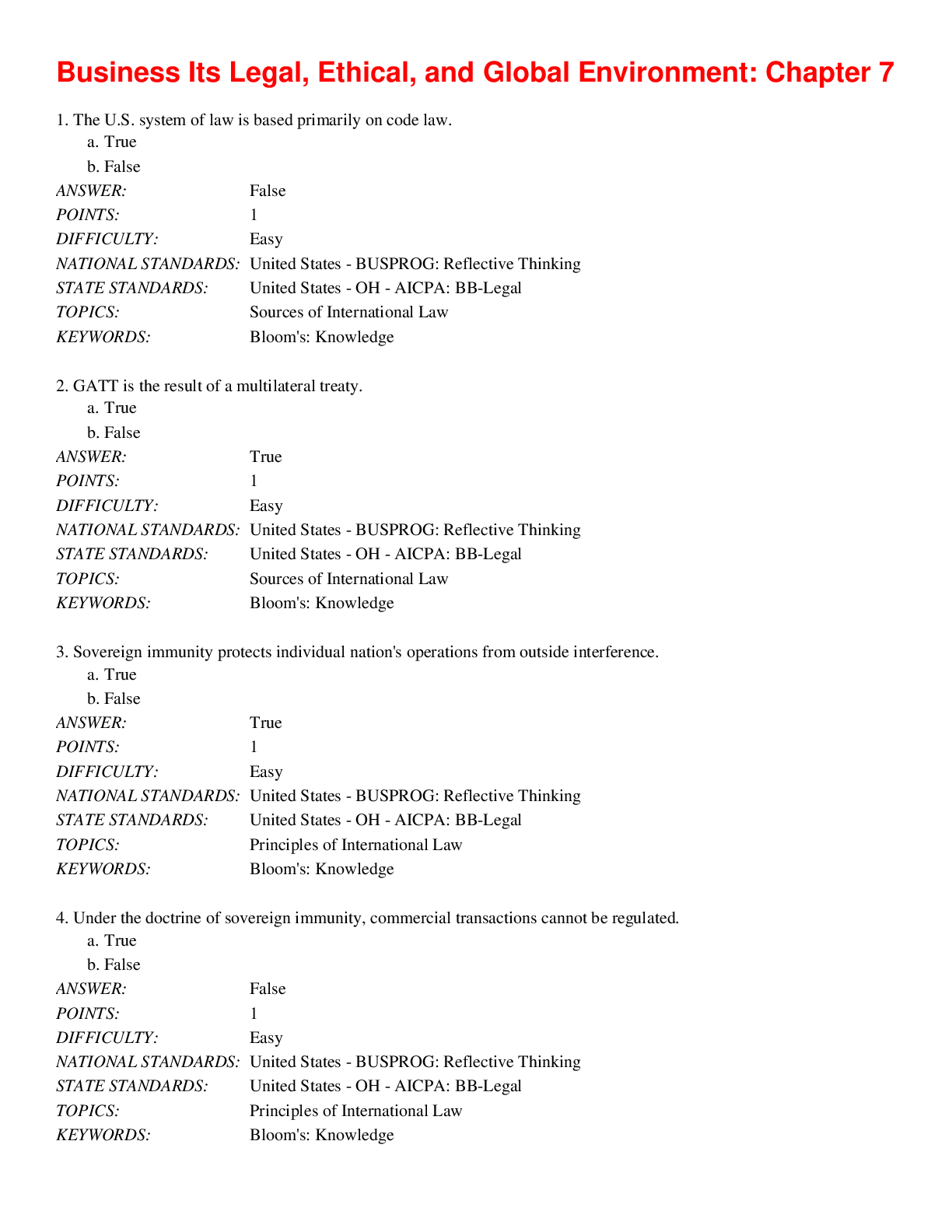
Buy this document to get the full access instantly
Instant Download Access after purchase
Add to cartInstant download
Reviews( 0 )
Document information
Connected school, study & course
About the document
Uploaded On
Dec 07, 2019
Number of pages
26
Written in
Additional information
This document has been written for:
Uploaded
Dec 07, 2019
Downloads
0
Views
76

